#the begining of my theory arc
Text
(an old post from about a month and a half ago that I found in my drafts.)
sharing my thoughts on quixis because their funky.
So, I like to think that Quixis is C!Sherbert, but also not C!Sherbert. Sort of in a similar vain to Hardcore!Sherbert or Craft!Sherbert. But unlike them, Quixis doesn't exist at the same time. They're from the future. C!Sherbert's future. But also. Not.
It's complicated.
#the forefather to my current quixis sherbert theory!!#its a little confusing#but i love it <3#the begining of my theory arc#...that hasnt ended#a tag to help find my own posts
2 notes
·
View notes
Text
Jujutsu kaisen manga readers are really funny to me sometimes. Do you know how many people who are fully caught up I've heard say "they never explain how itadori broke through a concrete wall" like. Yes they really do I promise.
[minor spoiler talk] Also the amount of people that were like WAIT (x) IS HIS MOM? only AFTER the character explicitly referred to him as a son as if it hadn't been so fucking obvious and laid out for months with that first face reveal??? Like who else?????
#obvious#jujutsu kaisen#jjk manga spoilers#not trying to be mean vecause i dont understand so much about this current arc but like. guys#also major spoilers for recent chapters in what im about to say#i thought from the beginning we knew the brain could still use the techniques of old vessels i had no idea until it was being discussed#that that wasnt like? a confirmed fact#idk it made a lot of sense to me ¯\_(ツ)_/¯#anyways dont ask me to explain hikaris technique theres plenty i dont know#stuff involving panda and cursed corpses too i feel are very obvious but people never acknowledge my headcanons u. their theories so its#confusing#bc i know im right about most of it and that last time we saw him w his siblings just added validity to my ideas#¯\_(ツ)_/¯#i do listen to podcasts and videos to explain a lot though certainly not trying to say i understand the whole series better than anyone els#its just interesting to see whats to me and other people
25 notes
·
View notes
Text
i don't keep up w spy x family regularly so i end up reading ~10 chapters all at once which i think is a good thing bc if i had to wait week to week during some of these intense arcs i would go insane
#sxf#86 was extremely good#the med student part of me is v concerned over the fact that loid#chose to disguise his injury instead of getting first aid for his literal hole-in-arm gsw#seeing his arm under running water from the shower nearly gave me hives#but ik this story is so unrealistic comedy-esque so it's fine he's fine he won't lose blood like that#side note i wonder if the fake skin was compressing the gsw in lieu of an actual bandage...#did they not have time to stitch it in the car? how did they bandage and sling nightfall#but do nothing for loid if not on his request bc???#that is my ongoing theory (compression sleeve) to preserve my sanity#anyway i do think i read the beginning of red circus week to week but not the last half i learned my lesson#i couldn't even imagine having breaks during this arc... i think 86 was a good wrapup too#if there's 1 more to finish it off then i can wait. no cliffhanger from this one rly
2 notes
·
View notes
Note
🎶🤩
also Control fic?
:D! ty!
🎶 Do you listen to music while you write? What song have you been playing on loop lately? - Yes, often! Earlier I was vibing to Trainwreck 1979, by the band Death From Above 1979, and I've had good luck working with Royal Blood's album How Did We Get So Dark on as well. Sometimes tho I just put on coffeeshop ambience over my tunes to take the edge off so it doesn't get too distracting.
🤩 Who is your favorite character to write? - this is a hard one? I don't have a big portfolio of characters I've written for, but Jesse Faden is fun because she's so normal. I don't have to project too hard outside myself - if I would just stand there and go "uh, well, I think we should do this", it doesn't seem like a stretch that Jesse would. Russell from half life alyx comes in at a close second. It's the ramble. :3
#yes i am writing fic for Control (2019) *through gritted teeth*#i have theories. and how will anyone ever hear them if i dont write at least 8k words about it#my second outing with scrivener too. incredible program but weird to approach story from any and all points not just beginning to end u kno#q&a#also i wanted corruption arc in the game itself and i never got it so like. taking matters into my own hands etc etc#just kidding. or am i!
3 notes
·
View notes
Text
half dozed off on the couch while thinking about an OC and just......dreaming up a scene/arc resolution that theoretically fits well but dear god would it be heavy to work with
#gonna throw this in the related oc tags#os: sideshow#oc: tyreen march#and then do...okay not gonna go in huge detail but i think a trigger tag is important#suicide ment tw#anyways#been pondering tyreen getting a dlc arc in sideshow as ive mentioned several times for awhile but never found#a resolution that i liked and am still not sure if i can handle writing the beginning#but...yeah. sideshow is very heavily about mental health and recovery. thats the whole theme of the game#so this idea i dreamed up. ty struggling so hard to deal w her past and ultimately making an attempt on her life#would Technically fit. it feels like it would be a logical progression of what kickstarts her arc#and she is absolutely saved in time. saved in enough time that very minimal damage is done at all#but uh! as someone who has lived thru two attempts of my own idk if i can handle writing that#like even shaking myself awake after it i lowkey feel nauseous#things to ponder i guess?#bc in theory it might help me work thru the emotions ive definitely been repressing about my own attempts#but there's also the very real chance that i could trigger a p bad disassociative episode if it gets too real#things to bring up to my therapist like 'hey do you think this is the right time to address this particular trauma? am i doing good rn?'
1 note
·
View note
Text
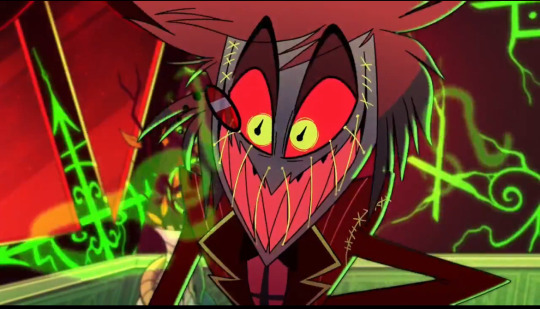
The image of Alastor's smile being bound by stitches gave me a theory about how his arc will conclude if he's on the path to redemption.
My theory starts with the idea of the stitches being a byproduct of whatever deal he made, and that he can't talk about the deal to anyone, meaning even if he wanted help with his deal, he couldn't say a word about it
It's such a horrific reality to live, and I can only think about how poetic it is for Alastor to have his free will so thoroughly revoked like that
I mean, in an earlier episode we saw how Alastor exercises control over the souls he owns (like Husk's) so it seems an appropriate punishment for him to be subjected to the same treatment
And that's where my theory kind of begins
This whole situation with his deal puts him in the position to start developing empathy by making him experience what he puts other people through
He gets to experience the same kind of helplessness he subjects others to, and it may even lead to him wanting to make amends with those he wrongs
Which could be a fun way to develop his dynamics with Husk. I mean, what better way for Alastor to start earning his redemption than by apologizing to Husk and freeing his soul?
#hazbin hotel#hazbin hotel spoilers#hazbin spoilers#hazbin alastor#alastor theory#Alastor#hazbin hotel alastor#alastor the radio demon#the radio demon#hazbin theory#hazbin thoughts#hazbin husk#husker hazbin hotel#husker#Hazbin hotel husk
516 notes
·
View notes
Text
Stede is in the Gravy Basket, Izzy is Alive
The season 2 finale of Our Flag Means Death is odd. It hits weird. I think I know why. And this is going to sound bananas, but give me a chance to explain. Maybe you’ll agree.
It has a huge tonal shift. It seems to speedrun Stede and Ed’s romance. It feels like we’ve missed out on something from the end of episode 7. The fight scenes and pirate plans are nonsensical, even for OFMD. And most egregiously, a prominent character is killed off in a way that feels disingenuous to his story arc, just for starters.
But I’m getting ahead of myself. We need to go back to the beginning of season 2. The season opens with Stede looking more piratey than ever. Beard, sash, earring… oh he’s his own fantasy of a real proper pirate. He’s clashing swords with Izzy Hands and demanding to know where Ed is. He’s dreaming. In the dream he kills Izzy. He and Ed run into each other’s arms while screaming each other’s names. They crash into the surf. Ed says “I knew you’d find me, Babe. I knew you’d find me, Love.” Stede keeps asking if they’re good. Ed dodges the question. Then Ed asked about the smell. Stede wakes up in a crowded room with farting and shushing roommates.
At first I thought the finale was supposed to be just a “satisfying” mirror to Stede’s dream. Stede and Ed call each other’s names and run into each other’s arms in a display that resembles a more grown up version of Stede’s dream fantasy. There’s some wild sword fighting not unlike Stede’s dream duel with Izzy. And Izzy dies.
It does mirror, but I didn’t find it satisfying. All of the characters except Stede feel flattened. Stede gets to make the heroic plan (that we never even hear) while there’s at least five pirates with better skill sets for it in the room. Ed, as Blackbeard, was described last season as “History’s greatest tactician”; Zheng Yi Sao conquered China; Jackie just took out a room full of British soldiers. Izzy and Auntie are right there. You could make arguments that Jim or Frenchie, or pretty much anyone could make a better plan. Then Stede says “It’s only suicide if we die,” which is horrible considering the plan gets Izzy killed.
Stede’s really the only person in that room who thinks Stede should be making the plans. So I got to thinking, what if it's not just mirroring the dream? What if it is a dream? Last shot of episode 7 is an incoming cannonball. Maybe he’s unconscious.
Huge shout out to @Arty_Sunflowers on twitter (I’m not calling it X, fuck Musk) for pointing out that that isn’t the only episode that ends with a cannonball. Episode 2 ends with Jim swinging a cannonball down at Ed’s head. Stede’s not just dreaming, he’s in the Gravy Basket!!!! (Stede even screams “Oh my God!” at the end of episode 7 in the same tone he screams “Oh my God, I don’t want to die.” in s1e9.
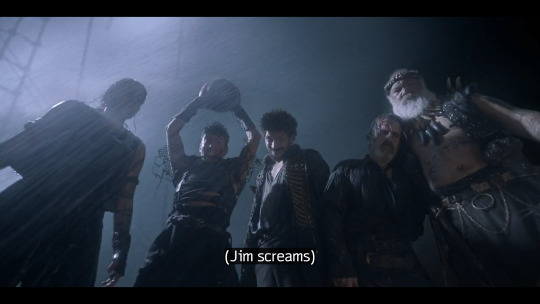
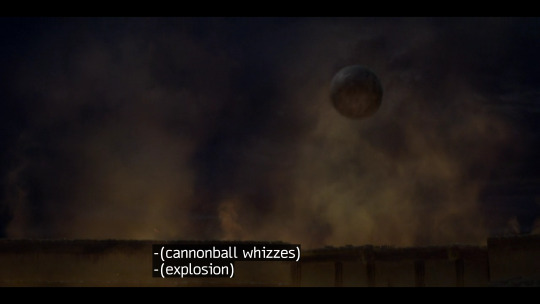
Stede’s hopes, dreams, and insecurities shape everything in the finale. And it helps explain the absurdities in the episode when you remember that Stede is living out pulp adventure and romance novels in his head. (He even looks like someone on the cover of one in his episode 1 dream.) But Stede can’t be dead, you say. He’s literally the main character. Well, Ed was dead for a whole episode. Let’s take a closer look.
I could and probably will do another essay on Lucius as a POV character and Ed’s mental health and how the threads they seemed to have dropped aren’t as dropped as they appear. But all of that hinges on me proving the Stede is in the Gravy Basket theory. So for this essay I’m focusing on that.
So for starters we’ve got the cannonball scenes. They’re eerily similar even if the method of cannonball propulsion is different. We don’t know Ed is dead and in the Gravy Basket for about half of episode 3. Neither does he. It makes logical sense you can be there without realizing it for a while. Buttons even said Ed didn’t know whether he was in the Gravy Basket or not in episode 4. It definitely messes with your reality.
One of Ed’s issues is self hate. He manifests Hornigold as his companion. Stede is desperate to be a good pirate and have people be proud of him. And he lives in his fantasies a lot. So his dream shapes his experience. There’s a whole bit about Zheng needing “soft” and Auntie saying she’s proud of her. That isn’t their issue. It’s discordant with the show previously. But it is Stede’s issue. He’s manifesting.
When we first see Stede and Zheng in episode 8, they’re in a familiar spot for Stede, the bridge from episode 1. But why are they alone? When we last see Stede and Zheng in episode 7, several characters are within 5 to 10 feet of them. Did none of them decide to escape with Stede? Izzy, Lucius, and Jim are closest. But we know Pete was there begging Stede to stay down during his fight with Zheng. Archie was definitely in the bar. That's why Jim entered the fight. So why is it only Stede and Zheng at the bridge? Because, going back to rescue others fits into Stede's hero fantasies.
Zheng and Stede also argue about who pulled who to safety and how they got there. Stede waxes poetic about being a failure his whole life, but things always seem to work out for him. He’s such a main character mediocre white guy in this scene. He saves Zheng from two random soldiers, then she has to save him from them. Then they fight a bunch more soldiers on the beach until Blackbeard manifests in full leather from the ocean. It looks cool. But it's absurd, even for OFMD.
Speaking of Ed, he begins the episode waxing poetic about nature and calling fishermen simple. Those things are more Stede than Ed. Pop pop tells Ed, “You have no skills” which is something Izzy said to Stede in episode 5. He also tells Ed, “If you were ever good at something, go do that, you bum.” If Stede’s insecurities could be distilled into one sentence, it would probably be that. (He also talks about being like a wave. I’m not 100% sure it's a The Good Place joke, but it would be thematically appropriate.)
Pop pop also tells Ed he “ruined dinner.” Back in season 1, in Stede’s flashbacks to life with Mary and the kids, Stede thinks he’s ruined dinner. But remember, we also see another version of the scene where Stede is laughing with Mary and the kids. Stede isn’t exactly a reliable narrator. Even in his own head.
Despite it being beyond unlikely, Ed finds soldiers reading one of Stede’s letters. I know physics in this show is sketchy, but this seems like a good time to point out no one found the red silk. Stede wants Ed to read a letter and for it to fix everything between them. The letter, plus Stede being in danger, make Ed swim out, find his leathers, and emerge from the sea with them on, while the music is the Swede’s solo from Stede’s fuckery in s1e6. Stede wants to be rescued by his handsome pirate in leather, again, just like a pulp adventure romance novel. Little chance of Ed swimming out and finding his kit. Even less of him getting leather pants on under the water.
Back to the beach… for some reason two squads of soldiers are wandering around out on an empty beach. A visually incredible fight scene occurs. It honestly reminds me of Pete’s story in s1e2, including flips. Ed and Stede yell each other’s names exactly as in the dream. Like I’m pretty sure they used the same audio track. The same song (I Love My Baby, Nina Simone) starts playing. Ed says “I love you.” Stede says “I know.” (We’ll come back to the Han Solo joke in a minute.) They have a bit more absurd fighting then Ed, Stede, and Zheng sit on the beach complimenting each other. And Ed calls Stede “babe”. He’s never done that outside of Stede’s dream and this moment. He’s called him mate a couple of times. Babe is exclusively in Stede’s head.
Back in the Republic of Pirates, the crew are locked in a cell that is actually the “vista suite” at Spanish Jackie’s. Izzy gets a heroic entrance. It’s as cool as Stede thinks Izzy is. And he gives a speech that sounds like what he probably told Stede to get him to relinquish the suit in episode 5. Piracy is about belonging to something. You can’t ignore the wishes of the crew. Izzy also knows details about Captain Kidd and Pinocchio. Not impossible, but not exactly Izzy’s wheelhouse. It is Stede’s though. He’s obsessed with pirate tales and he read Pinocchio to the crew.
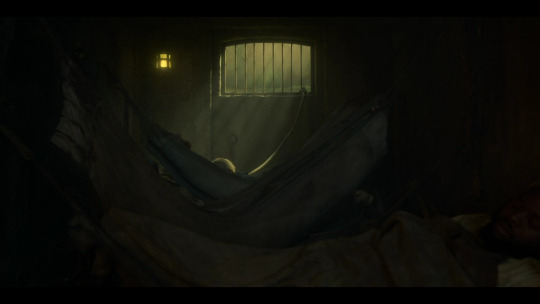

Stede, Ed, and Zheng show up just as Jackie has poisoned a bunch of soldiers. Stede makes a plan, despite everyone else being more qualified. Everyone disguises themselves as soldiers. Now we’ve seen the crew of the Revenge wear disguises. They never do the weird free styling they do here. Only Stede actually looks like a British officer. Zheng at least wears the disguise properly. Suddenly Ed has a multi gun bandolier like Blackbeard in the books. Pete ripped the arms off. Izzy is still wearing his vest. Doesn’t make sense if we’re going for stealth. Neither does not checking hostage Ricky for weapons or putting Izzy and his wooden leg at the front of the group.
If I'm right, Stede wouldn't know Ricky was behind the explosions. However, Ricky is basically evil Stede. He's Stede's perfect foil. All of this is reflecting Stede's psyche. So, of course, it's Ricky.
Izzy gets shot and says quite a lot of nonsense in his death scene. “They love you, Ed.” Um, 3 of them were going to leave like five minutes ago. Ed has made some progress with the crew, but we’re not at “they love you Ed”. The only person who thinks the crew loves Ed is Stede. Stede who weeps for Izzy while most of the crew aren’t showing much emotion. Stede can barely deal with his own big feelings. His fantasy doesn’t give the crew room to have them. Also, given the rest of the season, having Jim just let Ed be the person cradling Izzy doesn’t fit. The crew is also pretty stony at Izzy’s funeral.
I feel like it should be noted the last shot of Izzy in episode 7, he’s got one are around Jim and a hand on Lucius’s shoulder. He sat in Wee John’s lap in episode 6. Reactions to his death don’t make sense.
Also, Izzy’s terrible grave marker is very … Stede. He’d think it was a brilliant idea.
I didn't understand at first why Izzy had to die, even in Stede's dream world. Stede clearly likes him a lot better now. Why kill him? Well, it's because we're supposed to think Buttons is there to go to the Gravy Basket for Izzy. When actually he's already arrived in the Gravy Basket and he's there for Stede. Also, mentors die in pulp adventure novels. Stede sees Izzy as a mentor.
They go aboard the Revenge for Lucius and Pete’s wedding. It’s cute that the crew performs the ceremony, but I’d venture a guess that’s because Stede doesn’t know a captain should do it if it's legally binding. Stede does love the romance of it all. The sudden uptick in monogamy is also very Stede. He barely understands monogamous relationships. Polyamory is beyond him.
Then Stede and Ed, who earlier told Zheng they’d help hunt Ricky, go back to the island where Izzy is buried to start an inn in a run down shack. Stede knows Ed wants to do this because Ed told the (Taika’s) kids that they ran an inn. We hear Ed ask “Jesus, what is that smell?” Now, at first, I thought Izzy, because Ed “knows the smell of my rotting first mate”. But what was the last thing to happen in Stede’s dream? A fart joke.
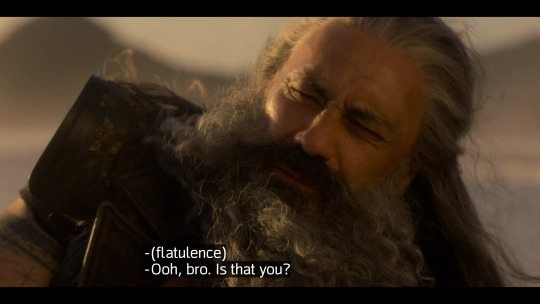

Last scene is Buttons landing on Izzy’s grave. To retrieve Izzy from the Gravy Basket? No, Izzy’s not dead. He’s with Jim and Lucius, probably watching over Stede’s corpse. Buttons is there to retrieve Stede.
This theory fixes the plot holes and dropped threads problem. We’re coming back to them next season. Ed's amends making should be far from over. And we see several moments during the season where he acknowledged that. And yet here on the island they've set up a horror movie and called it a happy ending. Well, Stede is the type of boss who thinks things are fixed with a pizza (Calypso) party. In Stede's mind, this is a happy ending. But really Ed is still off finding himself, Stede is (temporarily) dead, and Izzy (who is not dead!) is probably guarding Stede's corpse.
They haven't resolved the domestic violence thread, but they haven't dropped it, either. Izzy is alive. Stede and Ed aren't together (yet). There's still time.
This also explains some of the freewheeling nonsense David Jenkins has been spouting in articles. Ed doesn’t see Izzy as a father figure and mentor, Stede does. Stede almost turned to mush when Izzy approved of him. And David is writing a three volume adventure novel. Han Solo (Stede) is in carbonate (the Gravy Basket). The perfect end to the second act. See, I told you we’d get back to the Han Solo joke.
I still have problems with the season. I really think they need a sensitivity reader. Even just implying a newly disabled character was fridged is certainly a choice. Especially given the amount of time devoted to how the character handled the disability. The DV scenes were brutal, as well as the suicide attempt, and the Human Puppet joke. I think they need someone trauma informed and disabled in the writer's room. (David Jenkins hit me up!)
Overall, I liked season 2. Especially once I realized Izzy wasn't dead. I'm looking forward to season 3, the conclusion of the Gentle Beard arc, and hopefully 6 seasons and a movie of Izzy (to be clear, he's not captain) and the kids sailing up and down the coast being gay and doing crimes, occasionally checking in with Stede and Ed.
Seriously, David, call me.
Historical Note: IRL Blackbeard died on November 22, 1718, killed in a naval battle off Ocracoke Island in North Carolina. IRL Stede Bonnet died December 10, 1718, hanged in Charles Town, South Carolina for piracy. IRL Israel “Izzy” Hands survives piracy, death date unknown. I know this show doesn’t actually care about historical accuracy, but this lends a little support for my Ed died, then Stede died, and Izzy isn’t dead theory.
#our flag means death#ofmd#izzy hands#stede bonnet#gravy basket#Izzy Hands lives#David Jenkins I just want to talk
688 notes
·
View notes
Text
ELUCIEN | GWYNRIEL — MAASVERSE SPOILERS
I tend to see posts and videos from a multitude of people who seem to be reluctant to accept foreshadowing in the ACOTAR books—specifically regarding the endgame couples to finish out the overall series. As this post is simply beating a dead horse down, I find that it is very much needed as a specific group of people lack the capacity to understand the books.
Foreshadowing is not meant to be obvious. There are, of course, cases where it is relatively obvious, but only within the parameters of back-to-back scenes. Foreshadowing is meant to be picked up on, but to be fully understand later on in the story when everything comes to fruition. Examples of foreshadowing include color descriptions, specific use of language, emphasis on certain scenes, emphasis surrounding specific objects, et cetera. If something happens obviously and you can read the scene as-is, it is not foreshadowing.
I see many people who ship Elriel claim that there is buildup across the entire series that foreshadows why they will be endgame. As the books do not support that claim, it is outlandish and a spread of misinformation. Allow me to disprove this theory using the books alone:
— 🌸 ACOTAR: Zero interactions between Elain and Azriel as Azriel had not been introduced as a character yet. This book highlighted Feyre surmising that Elain would thrive within the Spring Court, that her sister enjoyed typical emissary work, and instead introduced Lucien as a character.
— 🦢 ACOMAF: This is the first book where Elain and Azriel met, as is this is where many Elriels like to claim that the Elriel build-up begins. However, this book says otherwise. Elain and Azriel’s first meeting is neutral, quiet conversation to ease a tense situation as Nesta/Feyre/Cassian/Rhys were creating an uncomfortable atmosphere and Elain meant to ease it. This book highlighted how in love Azriel was with Mor and how Elain was engaged to Grayson. Many Elriels also claim that the color of Elain’s dress in this first meeting—being cobalt—is indicative of endgame between she and Azriel. However, cobalt is also the signature color of Grayson’s family crest. Their interactions die out after that first meeting and instead focus on Feysand again. The throne room scene in Hybern also showed the beginning of Elucien and their mate bond, while Azriel was on the floor reaching for Mor. (I go more into this on my Tik Tok page: @oristian)
— 🔥 ACOWAR: When Feyre returns to the Night Court after her month in Spring, she finds that Elain has been within a catatonic state for the entirety of that month and has shown no signs of recovering—that is, until Lucien came along. Elain began eating and moving around once he came and after tugging on the mating bond, her visions first started showing. themselves. Everyone likes to credit Azriel for most of this, but all that Azriel did (take her to the garden) was suggested previously by Lucien. Lucien, who was not able to be alone with her due to Nesta and Feyre. Next, everyone tends to say that Azriel “saw” Elain when he named her power. “What we need is …” Contradicts such a thing. Naming a power does not cure someone of their trauma. Lucien is also canonically the first character to take Elain’s visions seriously and went in search of Vassa, ultimately finding Papa Archeron and creating an even deeper connection into the Koschei plot arc with Elain. This is also where we get the iconic half-step on the stair scene.
Elain is now kidnapped by the cauldron portraying itself as Graysen—Elain wanting so badly to be with her previous lover. This is a scene where many Elriels claim that it is supportive of Elriel being endgame. However, it is within character for Azriel to save someone, especially people close to him. Certainly, Elain being appreciative of being saved and kissing him on the cheek is cute, but that is not enough “foreshadowing” for an endgame. Next, Azriel hands her Truth Teller after Elain refused other weapons. Elain is hesitant and only agrees to take it once Feyre chimes in that she will not have to use it. Juxtapose this with Elain immediately giving it back after the battle is over, not saying a word, and instead falling into conversation with Lucien. Lucien, who is canonically the only character to credit her for assisting with ending the King of Hybern.
— 🌨️ ACOFAS: This is the buffer book that was meant to do two things: Establish Nessian as the next couple for the following book, and establish a clear love triangle between Azriel/Elain/Lucien. Elriels use this book to drive the idea of an Elriel endgame. While this book has scenes between Elain and Azriel, there is unfortunately no foreshadowing present enough to support that claim. This novella emphasizes, from a conversation between Rhys and Feyre, that Azriel may be inclined towards Elain due to her having traits that may remind him of his mother (Freud). We also have Solstice where Lucien brings Elain a gift—a gift that fully reflects her interests—Elain brings Azriel a gift, but Azriel does not bring Elain a gift. Azriel even questioning beforehand if he has to get the sisters a gift at all. Elain’s gift being superficial and more of a joke than anything truly meaningful to them as a relationship.
— 🗡️ ACOSF: The book that ended Elriel. We have this book set up as PRE-BONUS CHAPTER | BONUS CHAPTER | POST BONUS CHAPTER. In the pre-bonus chapter, we have a few scenes between Elain and Azriel that is a glance, or a very small interaction. The infamous scene that Elriels like to use to “prove” that his shadows actually like Elain is the scene where Cassian says that Nesta upset Elain and his shadows seemed poised to strike. His shadows reacted to his anger, not to Elain. Next, the Solstice scene where Azriel refused to be within the room due to the mating bond between Elain and Lucien and Nesta seeing that he was interested in Elain—which is never brought up again, however we do get a scene post bonus chapter of Nesta encouraging Gwyn and Azriel by calling him the “new ribbon.”
The bonus chapter ended Elriel officially as endgame. The chapter is told from Azriel’s POV and documents his lustful thoughts of Elain and how he wants a mate, hurt and confused why his brothers had two of the Archeron sisters and the third was given away to another male. Rhysand even asking Azriel what his plans are after seducing Elain and Azriel having none “past the fantasies he pleasures himself to.” This is also a chapter where Elriels like to claim that Elriel is a forbidden romance. ACOWAR Rhys clearly objects to this being the case. (I have a video on my Tik Tok going over this @oristian) The bonus chapter then moves to Azriel finding Gwyn, his shadows not warning him of her presence at the HoW. His shadows are curious about her and dance with her breath. Azriel then finds out that Elain rejected his necklace—the only Solstice gift that he has gotten her, and one he expressed as “nothing extraordinary”—and the next morning finds him re-gifting such to Gwyn. Azriel can picture her eyes lighting up at the gift and he smiles—this is also where mate language is used to describe the spark in his chest at the thought of her and the glow of the thought. “A thing of secret, lovely beauty.” A line that was used twice—one to describe the necklace, and another time to describe the thought of Gwyn.
Post bonus chapter has zero interactions between Elain and Azriel. The interactions between Azriel and Gwyn are charged and witty. Energetic. This is also where we see Azriel’s siphons glowing darker at the thought of the Valkyries in the Great Rite—the first instance that this has happened.
Next, we go into the last two remaining plot arcs: Koschei and Dusk Court. Both ACOSF and HOFAS have set Nesta up as the driver for the Dusk Court arc, with Azriel as the character to follow. With SJM’s Bloomsbury contract slating her to have two more main books with dual POV romantic interests, the Dusk Court arc book would only make sense having Gwyn and Azriel as the FMC and MMC of that arc. The Koschei arc has been carefully crafted for Elain and Lucien to be the FMC and MMC of that book, with both of them being set up for this since ACOWAR. Elain with her visions of Vassa, the lake, and Koschei’s black box, and Lucien being tied to Papa Archeron and Vassa and the mortals. (I have a video on my Tik Tok that goes more in depth with this @oristian)
— SUMMARY: Elain and Azriel do not have multiple books of foreshadowing, a Gwynriel and Elucien endgame is not fanservice, and the remaining two plot arcs do not support an Elriel endgame. If you have any problems with that, take it up with SJM.
#acotar#acotar series#maasverse#sjm#sjm universe#sjm books#sjmaas#acomaf#acowar#acofas#acosf#hofas#crescent city#lucien vanserra#nesta archeron#elain archeron#azriel#azriel acotar#the valkyries#dusk court#night court#spring court#feyre archeron#rhysand#elucien#gwynriel#pro elucien#pro gwynriel#gwyneth berdara#anti e/riel
302 notes
·
View notes
Text
Analysis behind the backstory and personal story arcs of A.B.A. and Paracelsus (part 1)
Sorry for the people who waited. Technical and real life delays and all that. On the positive, I happened to run into new resources in the past two days that have helped lining up the facts easier.
Anyway, I originally wanted to compress all the lore into a single post, but I find it’s so much more massive once you really dig into the analysis between the story across multiple mediums, the in-game animations and interactions etc. To make this more readable for you all and to make creating these posts faster, I’m going to separate them up into parts that focus on different facets of their relationship and lore as I progress through them.
This first part goes into their origins, and I hope this big post helps to thoroughly explain who/what A.B.A. and Paracelsus are, their backstories prior to STRIVE, and my own analysis sprinkled on top. I want to try to keep the info/lore dump minimal and focused, so if I mention a character without elaborating, I’ll leave a link but if I’m not elaborating more, it’s because they’re not relevant to A.B.A/Paracelsus' stories that much.
Related links:
Analysis of Paracelsus' initial bloodlust and its longlasting effects on A.B.A (Part 2)
This is the "Why ABA and Paracelsus can feel horny" lore/theory post
Flament Nagel - Paracelsus’ true form theory
The Red King and White Queen alchemical concept in A.B.A and Paracelsus’ relationship

The beginning with A.B.A.
First off, to introduce their individual origins, it’s easiest to start with A.B.A. She’s a homunculus, an artificial lifeform created by a scientist in his mansion, which was located in the mountains of a region called Frasco or Flask. But before she was ‘born’, her creator had been taken away by the military for his skills in creating artificial life, and so A.B.A. woke up alone.

Despite this, within the 10 years she spent alone in the mansion she was able to learn to read, write, and even create some alchemical magic (seen in some of her attacks in games before -STRIVE-). It’s assumed either she was created with a set of memories and skills, or she naturally learns very quickly. It’s probably due to reading leftover journals and research materials that she even learnt her creator’s name was Paracelsus.
Technically, A.B.A. could’ve left the manor quite easily, there was even a village not far from them. However, she understood that she knew nothing about the world outside and was scared to leave the safety of the manor by venturing outside to explore the unknown world. But she did yearn for freedom and to leave Frasco, so she took to fixating on keys, which she found fascinating in being able to unlock doors to different places.
In the last bit of her 10 years in Frasco, A.B.A would accidentally cross paths with the hidden the demon axe Flament Nagel (which she would later rename to ‘Paracelsus’ in honour of her creator, or just cos that’s the only other name she actually knew).
What’s a demon axe doing here anyway?
So what is Paracelsus? He is what’s known as a magical foci, which are objects or even people that get a soul or a collection of memories/emotions/desires attached to them, which eventually leads to them gaining sentience and often supernatural abilities. They draw from the Backyard, which is basically where the information that makes up all reality is stored in the Guilty Gear world, and also the source of magic. This is the origin of ‘demons’ within the GG world, like Paracelsus.

The story of how Paracelsus/Flament Nagel ended up in Frasco actually involves the ancient Nightwalker (technically not a vampire but he's basically a vampire without the bad stuff) known as Slayer.
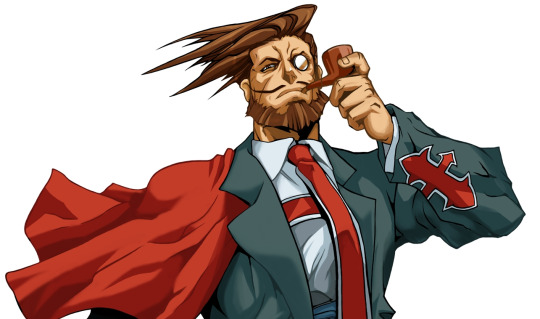
Now Slayer is this incredibly old, incredibly strong vampire Nightwalker, who nonetheless is a very nice guy who doesn’t need to feed on regular people because his wife, Sharon, is a deathless woman that he can feed on indefinitely without worrying about her dying.
Because of his immense age (AFAIK he’s the oldest of the main GG cast) and overwhelming power (he always holds back in-game), he has very insightful observations of Paracelsus and A.B.A.
The following screenshots are excerpts taken from the English transcript (available here) translated from the Night of Knives Vol.2 audio drama CD (you can listen to it here), and are from the perspective of Slayer recounting his encounters with Paracelsus and A.B.A.
Sometime near the end of the 100 year long war between Gears and humans known as the Crusades, Slayer was roaming a battlefield and came across a mountain of corpses of both Gears and humans. In the middle of it was a wandering blood covered warrior that was swinging an axe wildly. After confronting the man, Slayer realized that it was the axe that was the true master, the man had already lost his mind and was under its full control.
That axe called itself Flament Nagel aka the Flaming Nail, or the Sanguine Gale. I'll still be referring to him as Paracelsus at this point in time though.
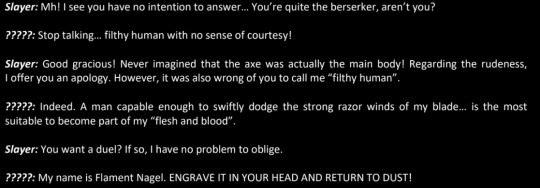
Now magical foci start off simple-minded, only repeating small word fragments, and evolve over time to become more intelligent and sapient. At this point, young Paracelsus was a demon axe who had just gained sentience on that battlefield. Hot-headed and hungry for blood, and wanting to prove his combat superiority, he challenged Slayer and got curb stomped. Slayer was disappointed in how primitive Paracelsus still was in mind and soul, so he left him there to rust.

However eventually, Paracelsus was picked up from that battlefield and was sent to the alchemist Paracelsus, creator of A.B.A. We don’t know if the alchemist knew what the demon axe was, or whether he even requested him specifically for research. But the alchemist ultimately didn’t let Paracelsus out, not letting him take control over him and hiding him somewhere in the depths of his mansion.
(Inaccurate information removed, updating with A.B.A.'s JP GG World entry from XRD)
It would be after A.B.A.’s 10 year long isolation that she decided for reasons unknown, to leave the mansion and explore the outside world. By pure chance, she comes across Paracelsus, who because kinda resembled a key, she immediately picked up and she fell in love with him and decided they were married from then on.
Becoming her key
It's always been known that Paracelsus has some form of empathic abilities, and that he could tell that A.B.A. was fixated on keys and assumed the shape of a giant key to entice her to wield him. This was also the first ‘manipulation’ that Paracelsus admitted he had done to A.B.A. during their heart-to-heart talk.
It’s been further clarified in this recent interview, that it wasn’t so much Paracelsus deliberately taking the form of a key to attract ABA, but because ABA had been so heavily fixated on keys that she saw Paracelsus as a key straight away. That image she had of him as a key seemed to immediately imprint itself on him the moment she touched him, because of his true nature as “an axe (that) transforms into the owner’s image” of what his wielder wants him to be.
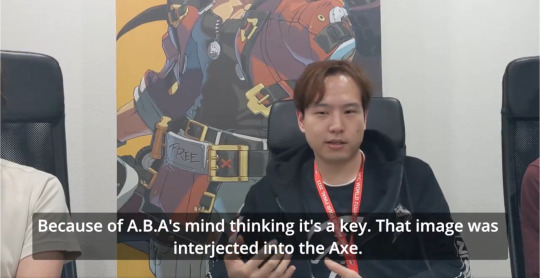
Slayer actually did mention this was likely the case over 20 IRL years ago in the audio drama CD, when he observed Paracelsus behaviour with A.B.A. in their second encounter.

Because A.B.A. never sees Paracelsus as a weapon, Paracelsus began to change to fit her ideal of what she saw him as, to become something more than just a weapon, and allowing Paracelsus to truly change and evolve physically and emotionally.

It’s important to note, Paracelsus isn’t bound to his wielder, and he doesn’t HAVE to allow this to happen either. Despite being dragged around by A.B.A. and acting like he has no autonomy; he actually has all the power to stop her from the start.

As Slayer notes, Para still has the power to completely take over A.B.A. 's mind and force her to do what he wants if he is truly unhappy. However he has never even threatened A.B.A. with this ability, and if not for Slayer knowing his past, no one would know Paracelsus actually can do this.
Whether consciously or subconsciously, Para was becoming more than just a demon axe from the moment he met A.B.A., and in his heart of hearts, he was begrudgingly accepting of his then situation-ship with her.
Fast forward to STRIVE and it's shown that he still continues to evolve to fulfill her 'vision' of what he is. When described as becoming more key-like, it's more obvious when you place both his old and new design side-by-side.
Notably, the blade part of his axe form has gotten smaller by STRIVE, just as he has sworn off violence and bloodshed by STRIVE.
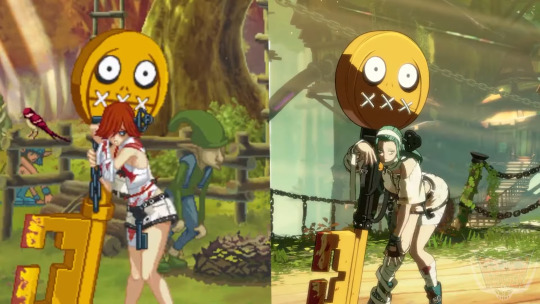
It's even shown in how A.B.A. wields him., especially when Para partially possess or influences A.B.A. in his Muroha mode in the old games (mechanically this is the Jealous Mode in STRIVE). A.B.A. would wield him like a proper 'axe' blade-first in XX/ACCENT CORE. In STRIVE, since A.B.A. is now the dominant one in Jealous Rage mode, she doesn't wield him like an axe and now wields him by...bashing his head into people.
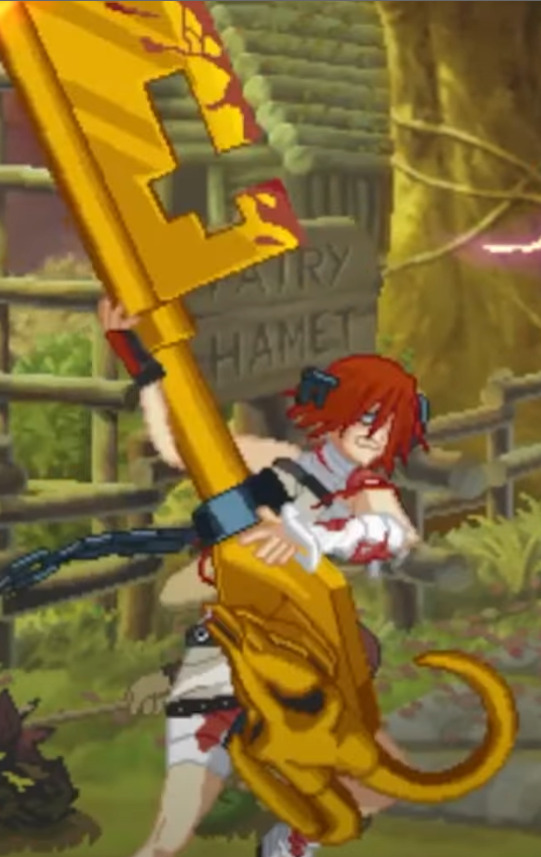

(Also I'll be going over the in-game animations and what they convey in a future post, don't you worry! You can view the comparison compilation here first.)
This even is shown in how A.B.A. uses Paracelsus as an actual key in her Overdrive "Keeper of the Key", which is a new move for her.
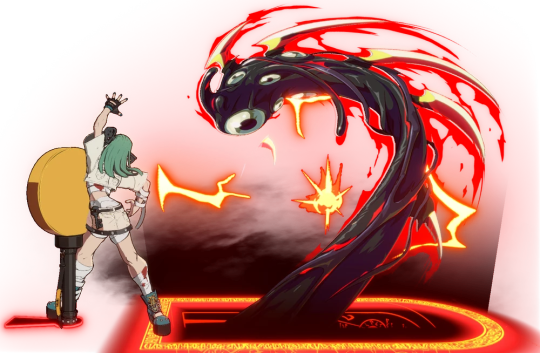
If we go further, I have speculated in this semi-crack theory that due to A.B.A. also interjecting her ideal of Paracelsus being her spouse over the years, that him actually 'reacting' to her advances now could also be an example of his evolution.
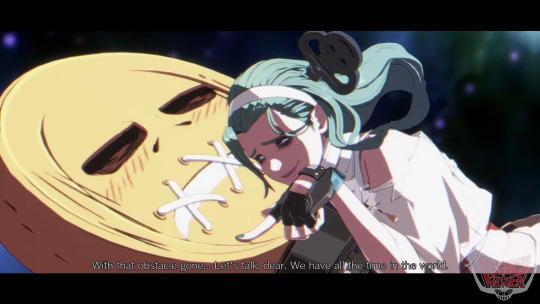
Even if he's trying REAL hard not to.
Hope this was an enjoyable read, let me know if you have any suggestions for improving readability or other stuff. Feel free to ask me questions through the inbox in the mean time that I'm working on the next part.
The next part is going to be analyzing and comparing Paracelsus' XX/ACCENT CORE Muroha mode to STRIVE's Jealous Rage mode, which has quite a bit of detail from comparing their effects on A.B.A. in in-game sprites/animations, plus how it reflects on the change in their power dynamics between games.
Edit: Part 2 available here
#guilty gear strive#a.b.a guilty gear#paracelsus guilty gear#long post is long#my analysis#arc system works#paraba#this is approximately a third or halfish of what I aimed for this week#character analysis#slayer guilty gear#daisuke ishiwatari#aba guilty gear
324 notes
·
View notes
Text
Let's Talk About Yor
Something is going on with Yor lately. Have you noticed it too?
Even though she wasn't in every chapter of the latest big arc (Wheeler-Yuri-Twilight confrontation), the arc started with her and ended with her and I think there's a reason for that.
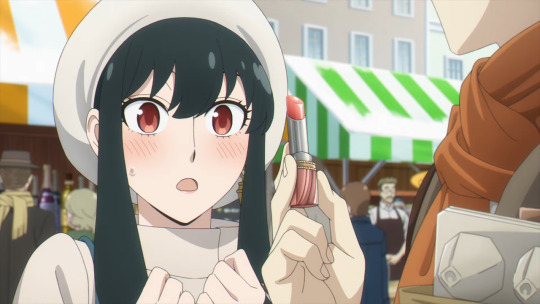
As I mentioned before, Yor is a very emotionally intelligent character. She surpasses Twilight on this, who struggles with his own emotions and the emotions of others too.
So the way Yor works is by becoming aware of an emotion or a change within herself and then she reflects on that. Then, things happen to her and she reflects some more about that issue or emotion, which is usually connected to the things that are happening around her.
Example: Look at the chapters leading to the cruise arc. Fiona showed up and Yor started questioning her place in the Forger family. Everything seemed to be cleared out during that same visit, but then Loid went to a tennis tournament with Fiona and Yor kept thinking about this. When the tennis challenge happened, even though Yor won, this didn't make her feel better, quite the opposite. Finally, Loid reassured her during that date in the bar, right after he got kicked on the chin.
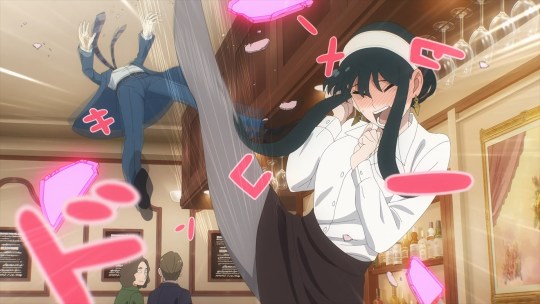
That should have been it, right? Wrong. More things kept happening to Yor and she kept thinking about her place in the world, whether or not she should keep her assassin job until we finally get to that moment when she realizes her reason to keep on living and protecting is her family.
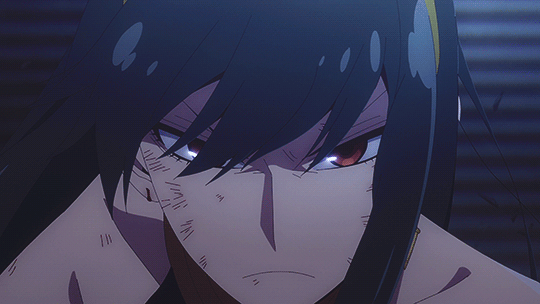
I get the feeling we're now at a similar point in the manga. Somehow everything keeps pointing to Yor, specifically to Yor and her relationship with Loid. Look at what's happening to Yor and tell me what you think is coming:
1.That chat with her office friends about gripes, marriage and welcome home kisses.
2.The welcome home kiss that never happened when she got home.
3."The fight" she had with Loid, or more specifically: thinking about her husband while he was shot by Yuri. (Those sad eyes said a lot!).
4.That honest talk she had with Twilight where she tells him she wants to take care of him.
5.Her chat with Yuri, where her brother asked her if she loves Loid.
6.Meeting the Authens, a real marriage, and seeing them kiss. (The Authens' Theory here.)
See what I mean? If we take into consideration the way Yor grows as a character and the way she realizes things, then where is this heading?
It's clear Yor is about to realize she has feelings for Loid!
The way the story keeps pointing at a kiss with giant arrows is not a coincidence. For Yor, who is inexperienced, a kiss would mean true love and a real marriage (which is what she wants). If the almost kiss didn't happen at the beginning of the story (when Yuri visited) is because back then, the marriage wasn't real. Maybe they liked each other and a little more, but they had just met.
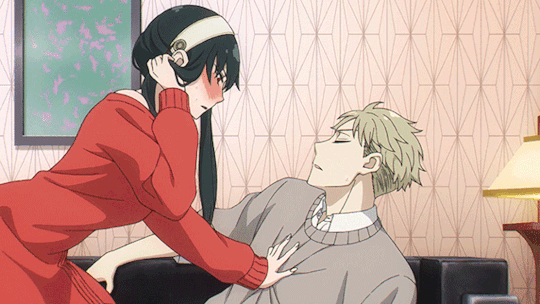
Now about the first twiyor kiss...we'll you can read my theory on that here. And I'd like to add a little more...
I know I said I wanted it to happen in the movie, but I admit I was being waaaay too optimistic about it. Sadly, I don't think it'll happen in the movie. Like some of you mentioned, that moment belongs to the manga and I agree.
However, all that is happening with Yor is leading to that kiss. I still believe she'll be the one who takes that step and will be the one who kisses Twilight. I insist; it's part of her character arc, which is about gaining confidence in herself, becoming a woman, and feeling worthy of love.
At this point, she's on the verge of figuring out her own feelings and after that happens, she needs to accept them and then figure out how she wants to proceed. I believe it won't be an easy task for her. Knowing Yor, she won't want to inconvenience Loid and impose her feelings on him. She also won't want to risk what she already has: her family. So it will take a while and maybe a little encouragement (maybe from the Authens?) to get to the point of actually want to act on these feelings.
But it's coming.
#spy x family#twiyor#loid forger#yor forger#sxf#spy x family meta#spyxfamily#loidyor#loid x yor#spy x family anime#spy x family manga#spy x family theory#twilight#spy x family twilight#thorn princess
738 notes
·
View notes
Text
Aziraphale and Crowley's unhinged character analyzis (pt1)
Controversial opinion:
Aziraphale and Crowley at the end of Season2 managed to accomplish the main goal they each had since the beginning of time. Only to realize that what they wanted no longer made them happy.
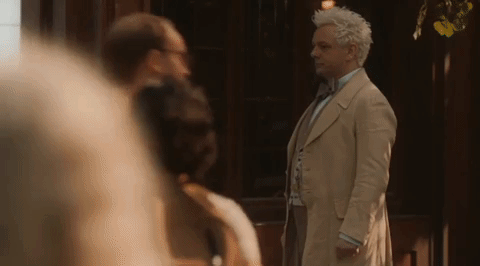
It sounds crazy, but to explain myself I have to do an in-depth analysis of their personalities and the possible transformation arc that both characters are probably going to have at the end of the Good Omens story.
Disclaimer: I have no idea about what is going to happen in Good Omens. This analysis could clearly be considered a theory since I'm not Neil Gaiman, but as someone who knows about narrative and character structure, I'm going to elaborate. Also, English is not my first language, so sorry in advance.
Aziraphale
First let's talk about Aziraphale. For two reasons, firstly because he is the one who seems to deserve the most defense right now; and second because Aziraphale, in my opinion, is the main character of Good Omens. This is because Aziraphale, out of the two, is the one who is likely to have the biggest change in his personality once his arc ends.
In a story, especially one like Good Omens with many characters, it is common for there to be many arcs, as every character has something to learn. Crowley, as a co-protagonist and love interest, is clearly going to have a change at the end of the plot, but his change won't be as big as our angel's.

First things first, what is a transformation arc?
It is the transformation that a character undergoes from the beginning to the end of the story. Basically, at the beginning of a story, a character is in a certain state of equilibrium, he lives and thinks in a certain way until he is exposed to a situation that forces him to act outside of his comfort zone. During this, he will undergo different changes that will be reflected in actions that take him away from his natural state until the climax, where the character will make a decision that will change his normality forever. This is important. In every story, the climax marks a before and after in the protagonist's life: whatever he decides at this moment has no turning back and will mark his life forever, so that after the climax, the character may again have a state of equilibrium but different from the initial one.
What is the climax of Good Omens? Well, in the 1st season we have the bodie swap and in the second season the separation of Crowley and Aziraphale. But of the story itself? It's still a mystery.
Neil Gaiman has already confirmed that Good Omens is a three-act story, so its climax will be located at the end of season 3. We still don't know what definitive change there will be in our characters… although throughout the series we have enough clues to at least know what they probably have to work on changing.
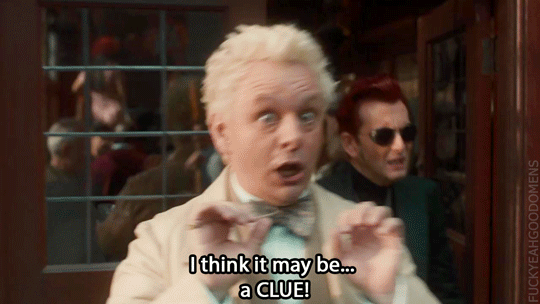
Aziraphale's Role
In order to analyze Aziraphale we must begin by understanding his role within the angelic hierarchy. Aziraphale was created as a Cherub and then, after Eden, became a Principality. Both ranks have one thing in common: they are guardian roles.
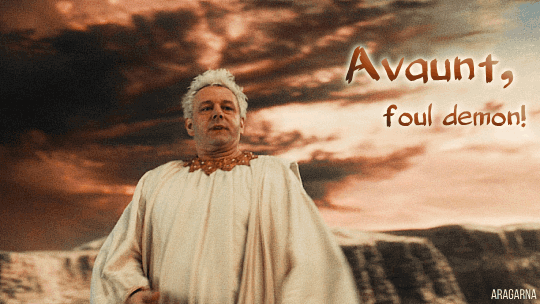
Cherubs are second in the highest circle of heaven, below Seraphims. They are described as "guardians of the universe from a divine plane and without direct contact with humans, although they positively influence them".
On the other hand, Principalities are seventh within the last circle of the angelic hierarchy, and the highest rank within it. They are the guardians of nations and countries, overseeing global events within politics and commerce.
So, Aziraphale was created with the main purpose of being only one thing: a soldier. His function is to obey and protect objects, places and beings. That is why he was the angel who received the sword of fire, his task was to protect Eden.
But he also has a very strong sense of intrinsic goodness that has led him to make erratic decisions throughout history that question just how much he is willing to obey orders.
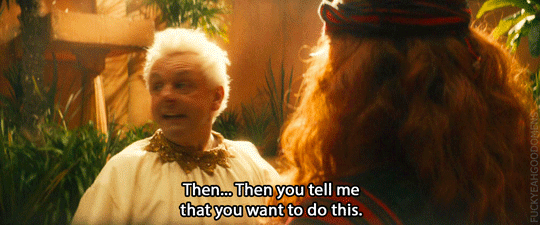
If Aziraphale feels that something is wrong, he won't do it. It doesn't matter if he has to go against Heaven or sin. It doesn't matter if killing a child saves the rest of the world, he won't do it. It doesn't matter if God will grant Job new children, he can't stand idly by. These actions make him stand out from the rest. A simple soldier just obeys while Aziraphale has a critical mind, he has too strong of an opinion about right and wrong. If an event happens that he considers evil, Aziraphale will go to great lengths to prevent it.
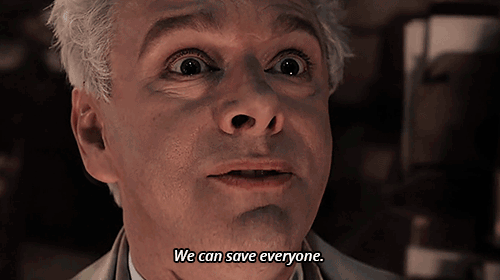
It is remarkable that the first thing he did having free will was to give his sword to Adam and Eve. Of course he did it with the function of protecting them but, by giving them his only weapon, Aziraphale was left in a serious state of vulnerability. He did it because he is good and kind, but it could also be considered an act of sacrifice. Here enters another important issue when talking about Aziraphale that relates to religion itself.
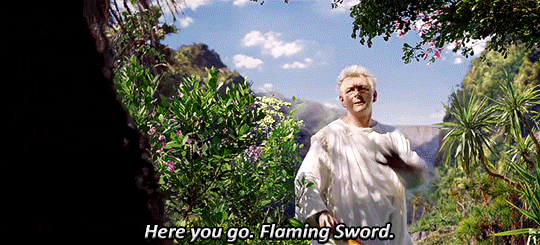
The Martyr Hero
One of the most basic conceptions about the Christianity is that without sacrifice a person cannot really be good.
Jesus was crucified to free us from our sins; Job sacrificed his whole life to prove that his faith was genuine. Even centuries later, the ecclesiastical institution maintains that the more you suffer, the poorer you are, the more chances you have of ending up in Heaven.
All the sacrifices made in life will eventually be rewarded in the Kingdom of God. It is the eternal figure of the martyr that is worshipped in Church, the idea that to really love, to really do good, sacrifices must be made.

Aziraphale believes this blindly. Now, he is an angel, not a human. He will not have an eventual reward of any kind, and that does not matter to him, because he considers himself lucky to be able to be a being of light who brings happiness to others no matter the price he has to pay. He was willing to fall only to save the lives of Job's children just because it was the right thing to do.

Performing actions for your own happiness without thinking of the consequences is frowned upon throughout the Bible. It is considered selfish and is a great source of guilt for all its faithful.
There is a line from the Good Omens Musical that has always stayed with me. When they argue, Crowley tries to talk some sense into Aziraphale by claiming all the reasons why he should help him avoid Armageddon, to which Aziraphale replies "you and I are not important."
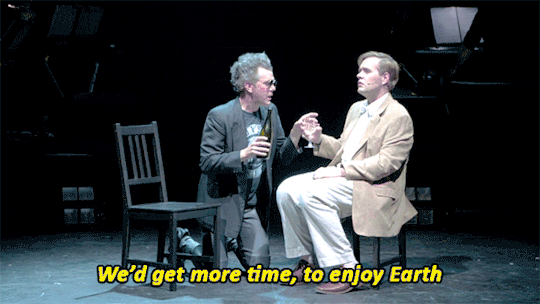
Why didn't Aziraphale quickly give in to the proposal to stop the end of the world? Why didn't he tell Crowley where the Antichrist was without hesitation? Why did he help Gabriel in spite of everything? Why didn't he kiss Crowley back although he wanted to?
Truth be told, Aziraphale does not prioritize his own happiness because he does not consider himself important.
At the center of it all is God, good and ineffable who would never let anything happen unless it is not amenable to the greater good, then there is all the rest. Aziraphale believes he is just a soldier with a mission: to protect the Earth and everything he considers worth saving. He is not on this list: his welfare does not matter to him because, in the grand order of things, Aziraphale does not believe he is important.
There is no afterlife reward for him, though that doesn't stop him from feeling guilty about wanting it.
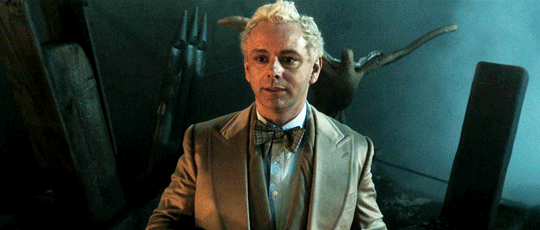
Aziraphale's dilemma
Aziraphale's great dilemma ould be summed up as:
Do I do what I want or do I do what I must?
Should he obey the rules or get what his heart yearns for now that it is within his grasp?

Throughout Good Omens, we learn Aziraphale has given into various temptations such as food. But these sins are small in comparison to what he really wants. For how does he explain to God that what his heart desires the most is to be able to love the Serpent of Eden?
He is madly in love with Crowley. He could lose everything: his bookstore, restaurants, music, art, but the feelings he has for him will never go away. It were years of repression, believing that if he loved him in silence, everything would be okay.
Now, in the season finale, Crowley expresses it, confesses and kisses him, offering him what he has always secretly wanted on a silver platter.

But Aziraphale was also offered a place in Heaven, finally being accepted by the family he misses. Aziraphale spent the entire 2nd season getting involved in trying to save Gabriel, in bringing Maggie and Nina together, getting perhaps a little too invested because he clearly missed having a purpose.

He was not well emotionally. He missed feeling that he does good because, despite everything, he believes in the potential that Heaven has. Aziraphale knows that if he is in charge, if he gives up everything that makes him happy, if he stops being selfish as he was all these years, he can make the necessary change to prevent the End of the World.
Aziraphale is a soldier whose main goal has always been to protect. Becoming the supreme Archangel he is able to protect everyone he loves. Because of this, he decides to sacrifice his earthly happiness and make the most difficult decision but the one he feels is right: to leave Earth, reject Crowley and become Head of Heaven.

The end of his arc and Crowley
Like any arc, Aziraphale's is clearly at the end of the story. He's already changed a lot, and he's done mostly so because of Crowley. Not just because of love, no, Crowley manages to awake something in him. Crowley is the driving force that encourages change in him, that reaffirms or questions his beliefs whenever he is in doubt about whether something is right or wrong. He inspires something that Aziraphale, an obedient soldier of the Lord never had: freedom.
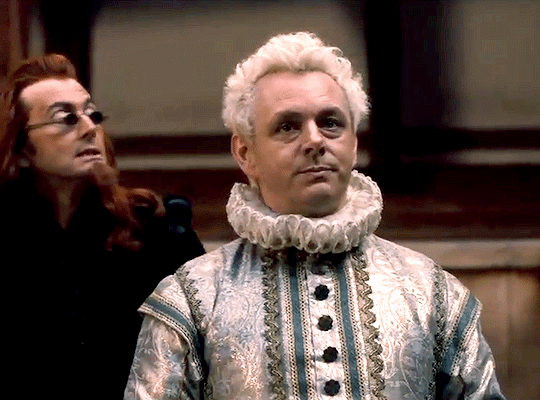
Obviously, our angel always had that spark of freedom, though repressed, hidden in the darkest part of his being because he knows it is something that makes him different from the rest and he doesn't like to admit that he doesn't fit in Heaven.
Because this means that he doesn't fit in Hell either, nor on Earth completely. Ergo, admitting to being different means confirming his suspicion that he doesn't fit in anywhere. But he never had to pretend this with Crowley.

Knowing all this, how will Aziraphale's arc end?
Well, he's going to have to choose between heart and duty again. Aziraphale is going to want to save Earth at the Second Coming, that's obvious. He is going to be forced to disobey Heaven once again as he realizes that he cannot change them. In this way, he will confirm something tragic: his sacrifice was in vain.
But it is necessary that he can assume this in order to understand that he is wrong:
It is not necessary to suffer in order to deserve love.
It is not necessary to sacrifice everything that makes you happy to prove you are good.
Eternal sacrifice is not the solution. Aziraphale has to learn that being happy and being loved is not a reward that has to be given, no, it is something he is worthy of without the need to sacrifice his life.
Aziraphale must understand that he does not have to prove that he is a good person by martyrdom. He is a good person because he is empathetic, smart and sweet.

The secret is to find the balance between love and duty, between good and evil, to embrace his freedom and find happiness by accepting his mistakes that make him different from the rest.
The easiest way is to learn to love in the most genuine way: the human way. Discovering that love does not necessarily have to be painful or repressed, that he can do it openly, that what he feels is not a test of faith, but the reward he has been waiting for all these years.
Aziraphale will ultimately become free through Crowley's love.
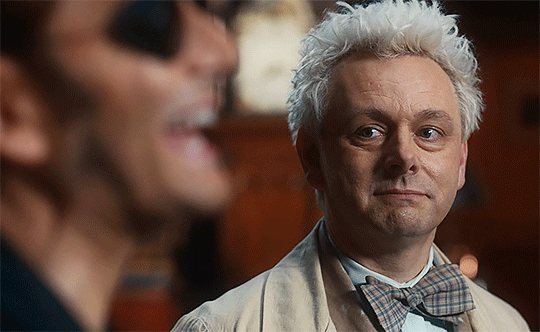
#stay tuned for crowley's analysis#some day i'll get over these two#but that day is not today#good omens#aziraphale#aziracrow#aziraphale and crowley#ineffable husbands#neil gaiman#character analysis#terry pratchett#crowley#good omens aziraphale#martyrs#transformation arc#good omens theory#amazon prime#give me s3 or give me death
623 notes
·
View notes
Text



Drawing Ryōmen Sukuna
Development notes
This post has been in the making since last year, before the manga has reached its current arc. My aim was to respond to comments that pointed out that my version of that time didn't look like the one in the anime.
I calculate everything I do and the way I do it. My current goal is to share my thoughts on the development of my take on him - simply because I'm a nerd when it comes to anatomy and I love figuring things out. It involves a lot of thinking, questioning, analysis, dissecting information and building theories. So I totally understand if it's not anyone's cup of tea.
MANGA SPOILER WARNING
The very beginning
I used to have a serious case of lack of self-confidence. My earliest art of Sukuna dates back to 2021, but it always felt like my skills are not worthy of this particular character. I never shared my art. I was also struggling to find my artistic voice. I was obsessed with the idea of semi-realism, but even if I managed to pull it off after weeks of stylisation practices, I didn't like the results.
Due to personal reasons, I stopped trying to draw him for a long time.
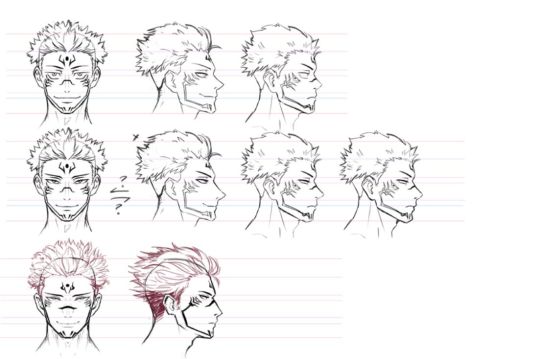
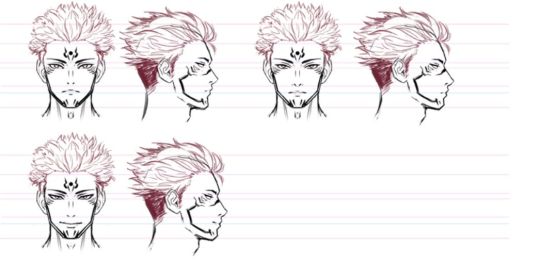
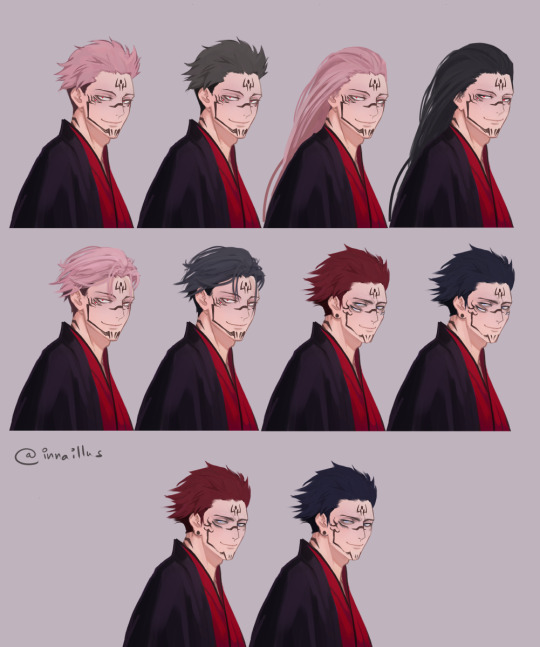
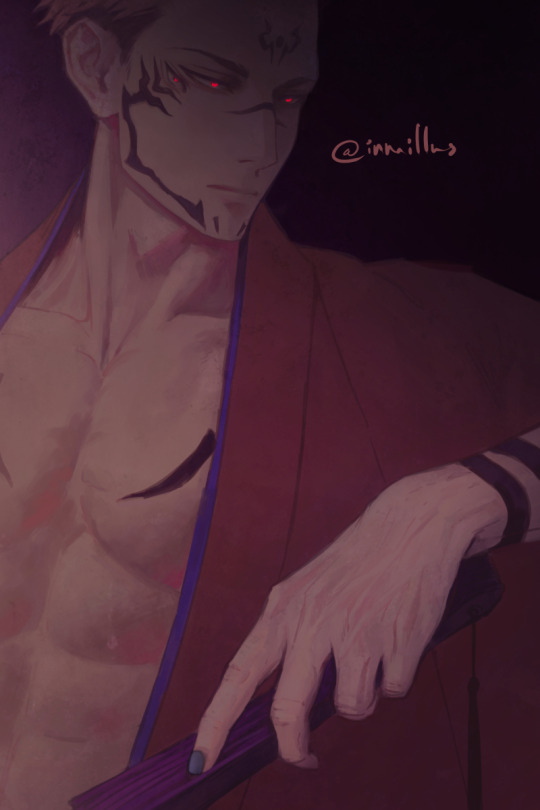
The development of "my" version
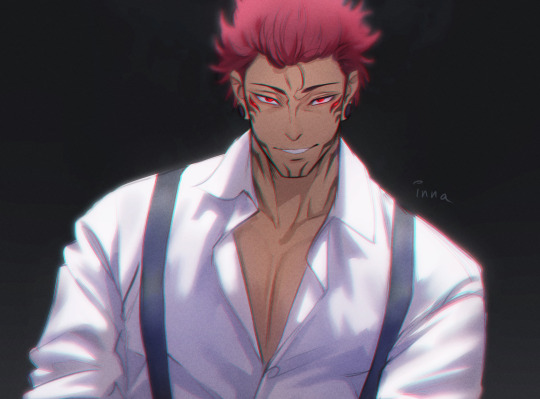
It was an entirely conscious decision to draw him differently.
The top reasons for the change was that I didn't want to sexualise him in his host, Yuuji, who is a minor. Back then I thought he inflicted the deformation on himself (extra limbs, eyes, etc), for the sake of efficiency, and I was curious what he looked like before that - or what he would look like in a civilised environment.
During the process, I considered a number of factors:
the beauty standard of the other JJK men - I wanted him to fit the lineup - his original appearance made him stand out quite much
in a setting where he adheres to the rules of society, more or less, I believe his MBTI personality type (ENTJ) would dictate a lot of his choices when it comes to appearance, at least to a certain extent. I thought he would choose to have an appearance that fits the beauty standards of the era
I kept his tattoos because it's a very distinguishing feature of him, but I also exercise freedom in the way I draw them, to make them as stylish as possible
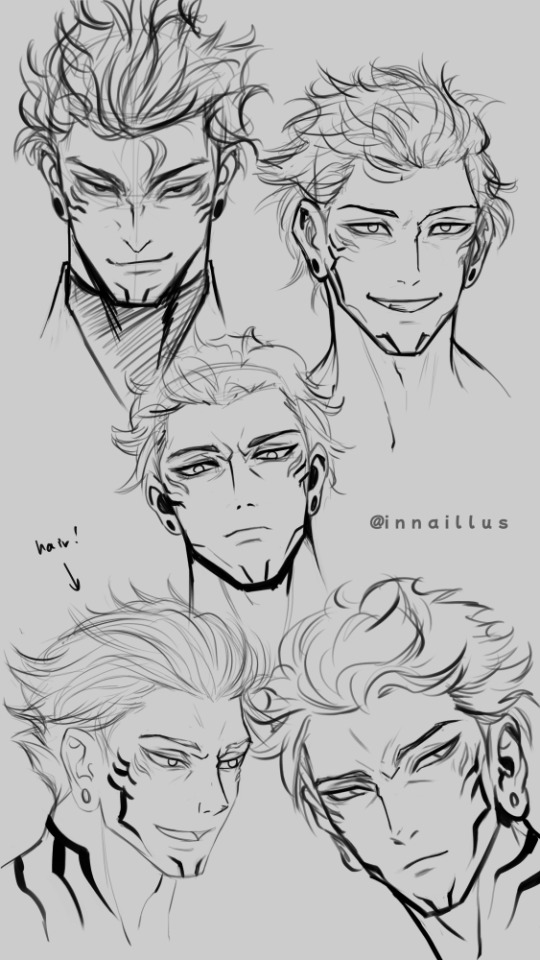
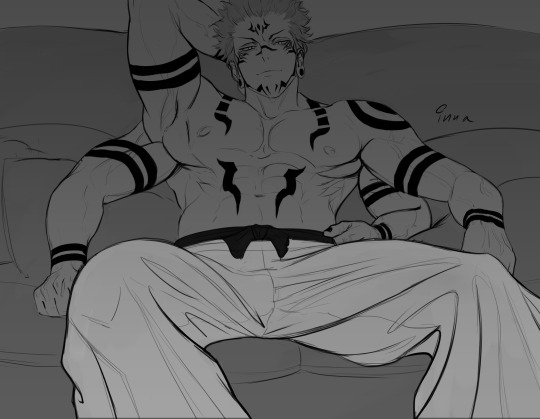
Reincarnation
I used to believe once he reincarnates, his proportions would be closer to that of a "normal" human, even if he has some extra limbs. However, his size and features are above and beyond of what we are used to, and even the story emphasises their malformed appearance. So a a whole new era of Sukuna started in my art. I chose my favourite manga panels of him and mix-and-matched the most attractive features into a figure that I consider on the fine edge of monstrosity and unconventional handsomeness.
Even when I draw him with a regular number of limbs, I keep his usual mass and proportions. I dubbed this form "true gains" form.
I also realised that some of the tattoos Yuuji's body displayed was a product of the partial reincarnation stage, like we see it on Tsumiki's forehead.
NOTE: Did anyone notice that Sukuna is getting progressively more and more human/handsome in the manga? When he took over Megumi's body, I also noticed that as the story progressed, he started to look older and more mature. I'm curious of it was a conscious decision.
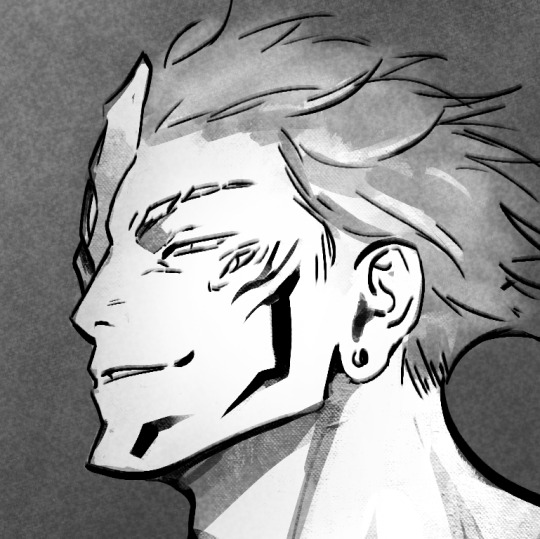
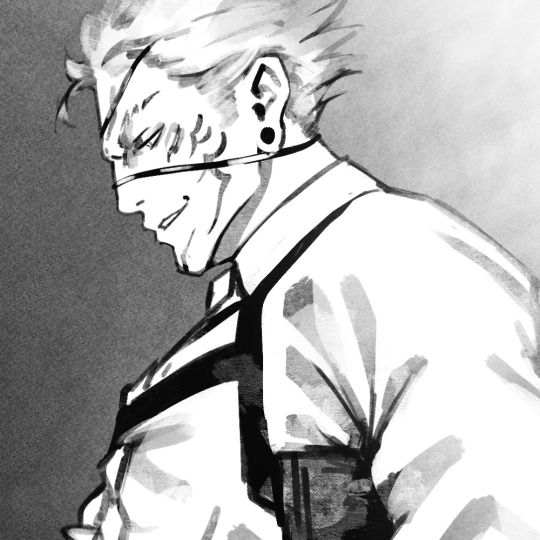
Twin dilemma and speculations
According to the Japanese wikipedia page, the mythical figure Sukuna could have been a conjoined twin. Despite my extensive digging in the matter, I was shocked by the recent lore drop.
My question: what does Sukuna look like in a universe where he did not absorb his twin in the womb during development?
It hasn't been confirmed, but I find it very possible now that he was born with his extra limbs, eyes and mouth, as well as the deformed, wide features. (...as opposed to my first theory about him altering his own body for the sake of efficiency)
This, however, would mean that in a universe where both him and his brother are born healthily, he would look different. There is the obvious lack of extra arms, eyes and mouth - but I believe he would also be closer to the JJK beauty standard of men, as far as proportions go (eg. more narrow face, anime-esque nose, larger eyes).
At first I was hesitant to accept this idea, as I'm very attached to the 4-arm hulk / "true gains" form now, but then I realised: this would mean that "my"version of him actually has logically explainable place in at least an alternate universe.
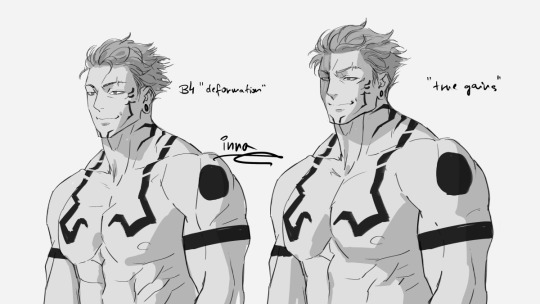
Thank you if you got this far.
I may edit this post later. Let's see where the story takes us.

373 notes
·
View notes
Text
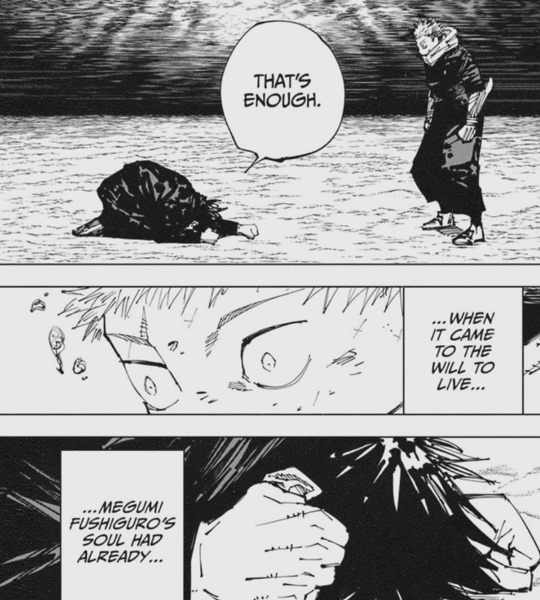
Megumi Will Start the Merger Theory
You heard me. I know this sounds wild and out of left field, but it's just a theory. A Jujutsu Kaisen theory. I fully acknowledge it might not happen, but please stick around long enough for me to argue why I think Megumi's character may go in this direction.
This one is for all the Megumi corruption arc truthers out there. I came up with this theory when it became clear that saving Megumi from Sukuna's grasp was going to be more difficult than just giving him a motivational speech, or punching Sukuna until their souls separated. Furthermore, I believe that Jujutsu Kaisen's manga won't end with the defeat of Sukuna. There will be one more curve ball thrown at us by Gege in the late game, and this is me trying to anticipate the pitch before the baseball hits me in the face. Underneath the cut I will speculate on the direction that Gege may take Megumi's arc, the relationship between Sukuna and Megumi, and Yuji's role in the finale.
What is a Corruption Arc?
Before digging in too deep I want to explain what I mean when I say I'm a Megumi corruption arc truther. A character arc is a story arc in regards to a character where a character changes from beginning to end. That's the most basic definition, arcs can be more complex, some arcs are actually inversions of the standard character arc where a character is defined by his lack of change.
However, those still need some element change, sometimes characters around them change to show contrast. For example, Eren is a stagnant character from beginning to end in Attack on Titan, but characters like Mikasa, Armin, Jean all grow up to show by comparison how little Eren has grown. Sometimes circumstances change around a character, and their lack of growth is a failure to adapt to those circumstances.
A character arc requires a change, but it's not necessarily a positive change. Often called negative character development, these characters regress instead of grow. This happens in many ways. One of the most basic examples of a character arc is a want / need arc. A want / need arc shows an emotional hole in the protagonist's life that needs repairing and how resolving the plot allows them to fill that hole. The protagonist usually knows what they need, but they know what they want, and often what they want won't actually fix them.
For example if I'm feeling sad I want to eat donuts to lift my mood, but what I need to do is learn healthier ways to work through my negative emotions. A character who keeps pursuing what they want, instead of realizing what they need won't grow, that's negative character development.
That's just one example though, Gege gave us a blueprint for a corruption arc in Hidden Inventory.
In Yu Yu Hakusho the character Sensui (directly cited by Gege as his inspiration for Geto in an interview) once was a spirit detective like the protagonist. No one describes him as corrupt from the beginning, in fact he's constantly described as more pure and upstanding than delinquent Yusuke Urameshi who likes getting into fights. He has a strong sense of justice, but rigid black and white views that come with it. Once he's confronted with evidence that directly contradicts his demons bad, humans good paradigm he cannot cope, and the narrative all but states Sensui's purity traditionally a good trait corrupted him because of his inability to adapt and his rigidity in in his beliefs.
Sensui goes through a corruption arc, albeit one offscreen and mainly referred to in backstory.
Geto's happens onscreen in its own story arc where he is one of two main characters. Much like Sensui he's presented to us as a sorcerer like Gojo, but unlike Gojo he believes sorcerers are obligated by duty to protect non-sorcerers who have no way of fighting against curses. You could argue that in some ways Geto and Gojo are the same type of jerk, but Geto's principles are clearly set up to contrast Gojo who at that age only was a sorcerer to flex his abilities. Geto's friendship often has him lecturing Gojo about respecting others, paying special attention to Gojo's feelings in ways that other characters don't, and also not being afraid to clash with Gojo over differences in morals.
If Geto is corrupt from the beginning there's no arc there, so he's clearly set up as being the moral fiber to contrast Gojo. We are literally presented with a scene where Gojo admits he could kill the non-sorcerers who hired a bounty hunter to assasinate Riko and feel nothing, and relies on Geto to make a moral judgement in his place, that society will already punish them and their slaughter is pointless.
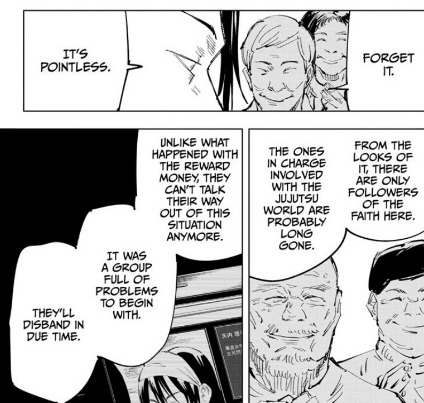
The irony is that later, Geto will engage in pointless slaughter killing an entire town in retribution for their abuse of Nanako and Mimiko. When Gojo confronts him about his actions, Gojo cites the same reasoning that Geto provided him to stop him from killing the cult members.
That Geto's murder of innocent civilians is pointless, because it won't achieve anything - his world of sorcerers is out of reach. Geto's clearly positioned as Gojo's moral tether, because he cites Geto's statement of only killing when there's meaning to it right back at him.
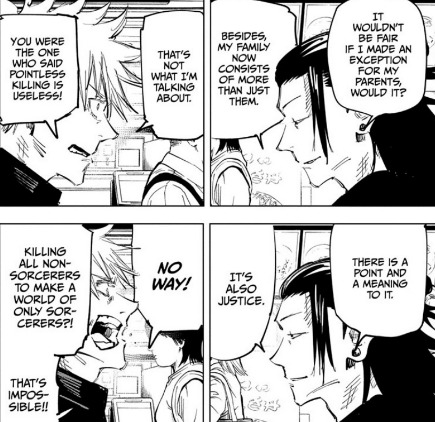
This is also where the corruption part of his corruption arc comes in, a change has taken place here. Geto hypocritically contradicts his earlier words, not just engaging in meaningless slaughter but also punishing people with his own hands instead of letting the justice systems in place take care of the punishments. Two things he held Gojo back from doing, only to do himself post corruption arc.
You could cite many things as the reason for Geto's corruption arc, but the common theme shared with Sensui is resistance to change. Geto saw the world in two distinct categories strong / weak, the same way Sensui saw humans good / demons bad. When Geto is shown that weak people are capable of bonding together to oppress strong people (the cult) and that sorcerers despite having strength are on the losing end of their society (they are expected to risk their lives and toil endlessly for curses 99% of the population can't even see), he cannot cope.
He especially cannot cope with the reality that Rika's death showed him, that he is not strong as he once believed. All of this combined leads Geto to double down, still seeing strong and weak as separate categories but now blaming normal citizens for the inherent corruption inside the Jujutsu World. Notice how Gojo a character with positive development seeks to reform from inside the Jujutsu World instead.
Geto also still wants to think of himself in the strong category, rather than facing the feelings that Riko's death and his helplessness in that moment gave him, as well as Gojo pulling he instead decides to double down on the idea that he's in the strong category, that he's superior.
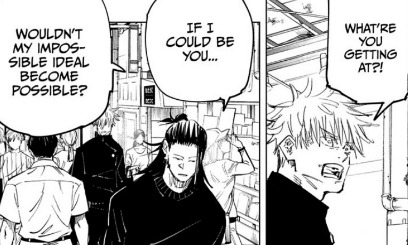
Geto even remarks jealousy at Gojo's godlike power for the first time, when before this he's always been the only person to treat Gojo as an equal - because Geto doubling down on his superiority complex begins imagining himself above others and therefore untouchable by trauma. It's also a grab for agency, because in this world sorcerers are rather agenciless, forced to be cogs in an unfair system. Geto incorrectly assumes agency = power. If he possessed Gojo's power he would be able to grab his agency back (which is simply incorrect because Gojo is one of the most agenciless characters in the manga, defined by his rigid role as the lynchpin of society).
Geto also doesn't mature. A mature adult lives in the world, and accepts that the world is imperfect. Geto is remarked as childish, first by Shoko when they are smoking together "sulking because no one understands you... sounds awfully childish if you ask me", and then by Yuta "You think you're a god? You sound like a kid!"
So we have, refusal to grow up, refusal to adapt to a complex world, resistance to grief, and grabbing for agency and power instead of fixing an issue inside himself - all of these combine to make the Jenga Tower that is Geto Suguru collapse.
The central question of Geto's arc, spoken by Gojo to Yaga is "Is it possible to save someone who doesn't want to be saved?"
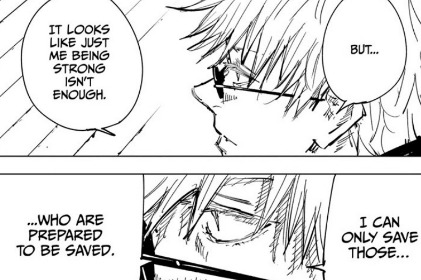
If Geto refuses all help, refuses to admit that he's wrong, and does not want to change then what really can Gojo do in this situation? Was he right to give up? Did he give up too early, refusing to kill Geto but also spending ten years just ignoring the problem until Geto attacked in Jujutsu Kaisen Zero? Did it not matter what Gojo did because ultimately Geto's choices are his own?
There's no clear answer, because it's a question the author is asking the audience to ponder. It's also a question directly set up for Megumi to answer, because when Gojo is unable to do a thing for Geto we see his next action is to seek out Megumi. His words imply that he sees Megumi in Geto and advises him not to be left behind, he also clearly became a teacher in order to not let what happened between him and Geto repeat in the next generation.
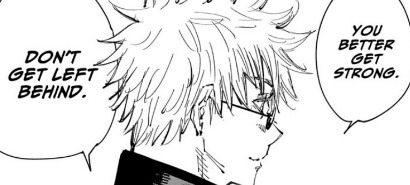
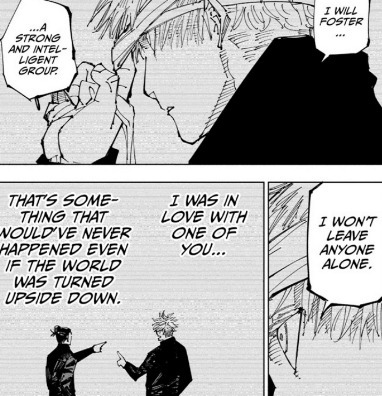
In spit of Gojo's best intentions, he's not able to protect Megumi from any of Sukuna's designs toward him, or basically anything that happens in post Shibuya's. Simply raising Megumi to be strong, did not prevent him from suffering trauma in his youth on Geto's level.
There's even a deliberate parallel, they both witness the death of an innocent who they promised to protect (Tsumiki, Riko Amanai) and they both have had their body taken from them, Geto's corpse is turned into a literal puppet to help advance Kenjaku's plans, Sukuna steals Megumi's body in order to revive himself in the modern era. They're both even used as tools against Gojo, Kenjaku uses Geto's body to awaken memories in Gojo and complete the sealing. Sukuna uses Mahoraga to learn the world splitting slash that cuts through Gojo's defenses.
Megumi also has a set of values that society spits in the face of. Megumi wishes to selfishly protect his sister, and pick and choose who to save. Geto believes the strong are obligated to protect the weak. Geto sees weak people who are corrupt and not worthy of his protection and also the reality that sorcerers are the exploited class, Megumi is forced to kill Tsumiki with his own hands.
These are intentional narrative parallels to show the risk of Megumi may walk the same path as Geto, especially since Megumi is in many ways a pure child like Geto himself.
Dark Phoenix Arc
There's one more corruption arc I want to compare Megumi's too, to give some idea of where I expect Megumi's arc to lead.
The Dark Phoenix Saga commonly refers to the story in Uncanny X-Men #129 - 138 of Jean Grey’s corruption by the power of the Phoenix and the Hellfire Club. It was considered incredibly shocking for its time. One thing to note is while Jean Grey is famous nowadays, in early X-Men she was the weakest character and her role was basically limited to “The Woman” of the team.
Elevating the helpless damsel woman to the most powerful member of the team, if not the entire universe and then having her turn evil had never been done before. It was a jaw-dropping shock at the time.
The reason I am citing the Dark Phoenix arc as an example, is because both Jean Grey and Megumi's character arc revolves around themes of agency, how it's stolen from them and how they reclaim it.
The basic summary of the Phoenix arc is that Jean Grey is initially given a massive power boost when she's possessed by the Phoenix. She stays behind on a crashing ship only to be saved by the Phoenix, a guardian, alien entity of immense power that was locked away in a crystal. Jean Grey returns as Phoenix with a massive power boost, but there's several ambiguous elements that compromise her agency. It's implied that Jean Grey always had a tremendous power that was in part sealed away by Professor Xavier using his telepathy (infringing on her agency) and that while the Phoenix gifted Jean Grey power, it's also an alien entity effecting her mind and body.
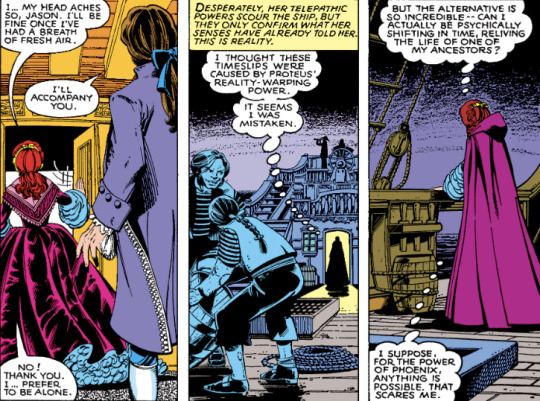
On top of that when she acquires the power, outside forces begin wanting to manipulate Jean in order to gain her power for their own ends.
A group called the Hellfire club begin to psychically tamper with her mind. They trap her in hallucination world where she is a woman of the 1800s, (not famously known for their agency) and in love with the leader of the Hellfire Club, even going so far as to give her false memories in order to convince her that this is reality.
The concept of agency and how it's constantly infringed upon, even by someone who's supposed to be on her side (Xavier) is central to this arc. Jean evetually escapes from the Hellfire club's manipulation, and reclaims her bodily autonomy but the story does not end there.
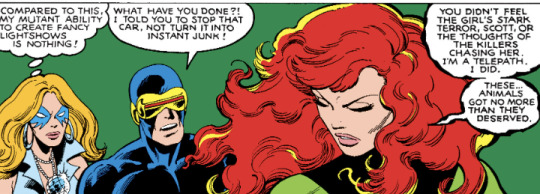
The subtle changes in Jean's behavior still continue, even after Jean has freed herself from the mind control. Is this the result of being given too much power at once? Is Jean losing control because she was never taught to properly handle her powers?
Jean Grey is also the character with the strongest potential in the main cast (much like Megumi) and also a character who's been prevented from using her powers to their full potential and even had her powers stolen and used by others (Much like Megumi).
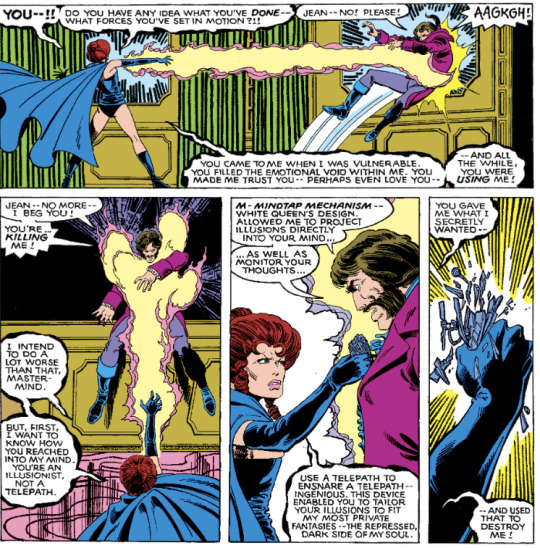
It's heavily important that Jean's corruption into dark phoenix happens after freeing herself, and in response to the Hellfire club's machination to take all agency away from her. Jean instead makes a grab for power and agency by abusing her power as Dark Phoenix.
Jean even mentions that turning against her friends and trying to kill them as Dark Phoenix, will sever the last tie holding her back, will get of Jean Grey for good and cause her to fully embrace being Phoenix.
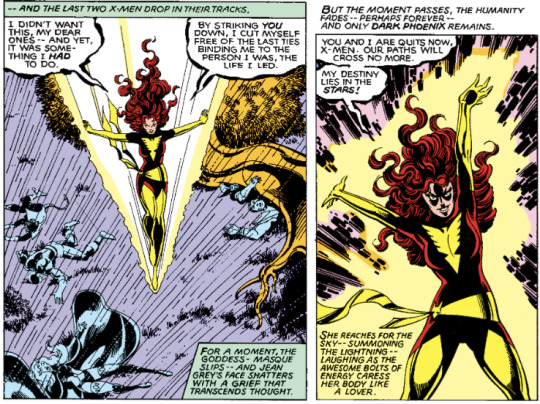
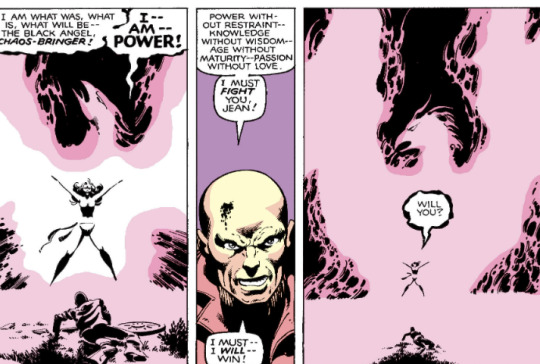
Jean has flipped entirely, overembracing the power and agency that has been stolen from her again and again, but really how could someone not desperately try to take back control of their lives after being mind controlled or having their mind violated multiple times (the phoenix itself, the hellfire club, even by Xavier).
How can someone never allowed to use her power, or given choices on how to use her power, not be corrupted when after being stepped on all of their lives the power of a god is dropped into their lap?
This is why I believe Megumi will be the one to initiate the merger, because his entire arc has been about having his power stolen away from him and what would Megumi do when given total power over the merger by Kenjaku?
Megumi Corruption Theory
The biggest piece of evidence for this theory is right here, Kenjaku specifically says to give Megumi Fushiguro the authority to start the merger.
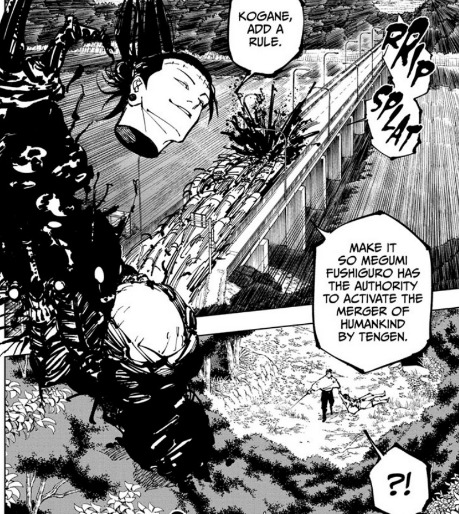
There's a technical reason for this, Sukuna is currently in Megumi's body, and Sukuna himself was actually registered in Yuji's place because Yuji was built by Kenjaku to be a cage for Sukuna.
However, it can also be read as foreshadowing. If you believe like I do that the merger has to happen, then Sukuna can't be the one to initiate it. The simple reason why is that the main characters will have to be alive to fight against a merger, and Sukuna has set the condition that he'll start the merger after killing the main cast in order to motivate them to fight him with everything they have.
If Sukuna is going to start the merger after killing all the main characters, then he can't be the one to start the merger because the main characters have to be alive to witness the merger take place and fight against it somehow.
Therefore, logically if the merger is going to occur the only person who could possibly activate it is Megumi Fushiguro after reclaiming his body.
There's more foreshadowing then this one instance however, and a lot of it revolves around Sukuna and Megumi's unique relationship and Sukuna's role as a character.
As for why Megumi would possibly start out the merger, it's the same as Jean Grey, a character denied of agency suddenly has all the power in his hands, who wouldn't be corrupted? Especially Megumi, a character who's just been robbed of his sister and his mentor, and his purpose in life besides that (protecting Tsumiki)? Why wouldn't he lash out if suddenly given the power to? His friends are trying to save him yes, but Megumi is begging those save friends not to save him to end it all.
How do you save someone who isn't prepared to be saved?
How is the story going to answer that question, if saving Megumi is a matter as simple as just beating up Sukuna and giving his body back to him?
Onto analyzing more foreshadowing, but first a brief tangent on the nature of foreshadowing in Jujutsu Kaisen. Every major twist in the manga is foreshadowed far in advance. Kenjaku beng the one to possess Geto's body - foreshadowed by Kenjaku killing Mechamaru when Geto was against killing young sorcerers, and the fact Geto was deliberately killed onscreen with no explanation provided to the audience on how he could possibly revive.
Sukuna calls the purpose of the bath to be near evil, to submerge Megumi's soul.
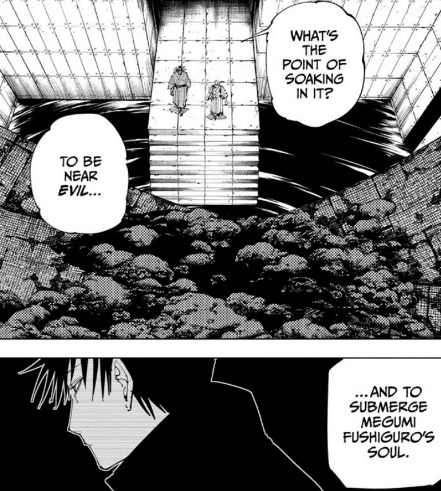
If saving Megumi is just a matter of ridding him of Sukuna's possession however, then how does that allow Megumi to reclaim his agency? What agency does a damsel in distress who just exists to be rescued have?
Megumi's entire arc has been defined by the potential power that everyone sees in him, and his inability to reach that power especailly since other characters (especially Sukuna) seek to steal that power for their own ends. In the culmination of this arc, Sukuna literally steals Megumi's body, and his bodily agency.
How does Megumi finally live up to that potential if Megumi's arc ends with him being saved by Yuji? How does this make Megumi grow or change in any way?
Sensui, who is once again Gege's model of a corruption arc is referred to as a pure angel that was inevitably grew scarred and defiled, by his close personal confidant Itsuki. Not only that, but sinking deep into despair made him grow stronger not weaker.
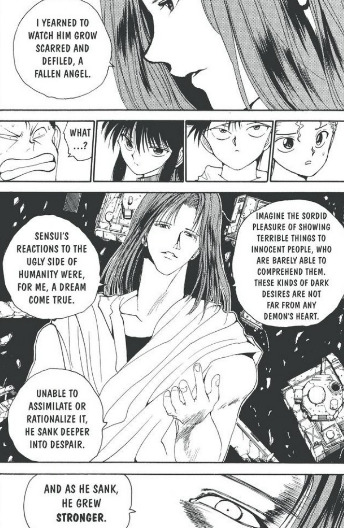
Itsuki is also, a demon who met and encountered Sensui and then took a deeply invested perosnal interest in watching Sensui be corrupted in real time.
Megumi also has a curse that took a sole interest in him because of his talent and potential, then had a hand in bringing him closer to evil in order to make him sink into despair. There's once again the symbolism of purity being corrupted.
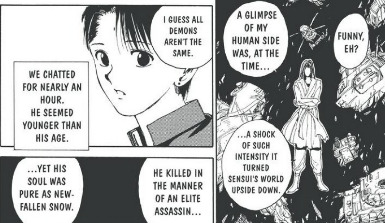
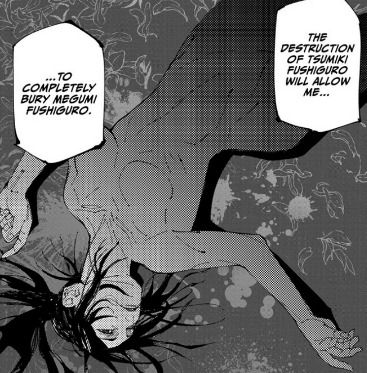
This panel explicitly shows white lilies (symbols of purity) being torn apart and blackened to symbolize what Sukuna wishes to do to Megumi in order to further is own ends.
There's also the heavy budhist symbolism with Sukuna's role in the story, and the way he influences the rest of the cast, especially Gojo Satoru who is our stand-in for the Budha. If the goal of Jujutsu Society is to attain enlightenment (escape cursed energy probably the only thing that will end the miserable lives of sorcerers), then the merger represents the opposite, Kenjaku's goal of optimizing cursed energy by mixing humans, sorcerers and curses to give birth to a new being.
That's also a conflict that needs to be resolved, but Sukuna by pushing forward the optimizing of cursed energy and representing the peak of sorcery living only for sorcerery and his own strength represents a Mara.
Sukuna is comparable to the Celestial Demon Mara in budhist mythology, more on it in this thread. In budhist cosmology, Mara is the “personification of the forces antagonistic to enlightenment.”
If the ultimate goal of budhism is to escape the cycle entirely and stop being reborn in the sensuous realm, Maara instead tempts people to stay in this realm. it defines impernanence by suggesting we stay in this realm forever. It defies Dukha by saying we indulge in physical pleasures in this realm, that we should seek to satisfy ourselves even if budhism argues that life is primarily unsatisfactory.
We even see Sukuna literally tempt a budha-like figure into remaining in this earthly realm. After all aren’t we shown that Gojo achieved enlightenment at seventeen and let go of earthly emotions like the need to be angry and avenge Riko’s killer because the feeling of oneness with existence was too good in that moment.
A lot of people noticed what they thought was Gojo acting out of character in the fight with him and Sukuna, by enjoying the fight and choosing his selfish desire to love jujutsu and fight as a sorcerer over his responsibiltiy to protect children. Something which Nanami says in his dying hallucination that Gojo only ever lived for the pursuit of his selfish desire for Jujutsu in the first place.
Gojo in his last fight against Sukuna forgets about saving Megumi or at least makes it a lesser priority, because Sukuna tempts him to do what he's always wanted to go all out in a sorcery fight and have the freedom to use his powers to the best of his ability. Hoewever, even after using his full strength, Sukuna cuts down the notion that he is above humanity and drags him back to the earth - literally calling him unenlightened.
“This is goodbye. You were born in an era without me and hailed as the strongest yet you turned out to be painfully ordinary…”
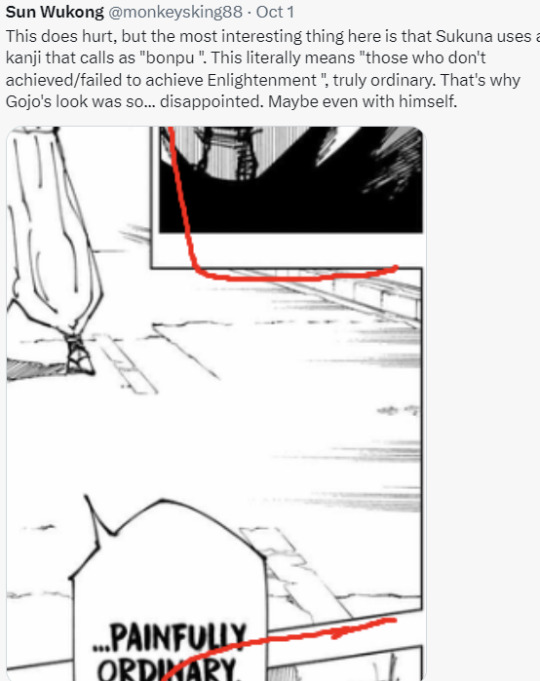
Does Sukuna not represent this temptation for all characters? Sukuna represents the selfish ideal of sorcerers, using his powers for himself to satisfy his hedonistic desires and because of this he has the most agency in the story and the story at times even bends to his desires.
Characters even fight for Sukuna's recognition, Hajime, Jogo and Gojo are validated by that same recognition in theend.
Why wouldn't Gojo and more importantly Megumi who are characters with very little agency not jump at the chance to be more like Sukuna, especially if it brings Sukuna the freedom he possesses?
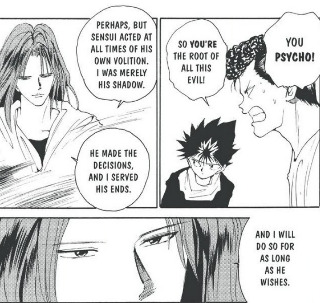
Itsuki refers to himself as Senseui's shadows, leading him to act on his darkest impulses and enjoying watching the corruption spread. Megumi is literally a character who's Jujutsu revolves around his shadow, and summoning powerful Shikigami from it in order to fight. A character with an incomplete domain expansion (another loose plot thread with Megumi that would be unresolved if Megumi were simply saved) which is his own creation, which might surpass Mahoraga the technique handed to him.
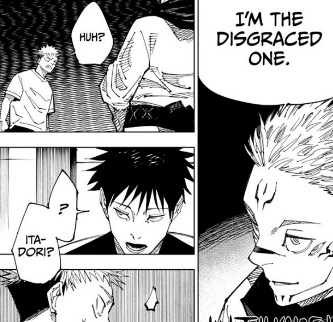
In addition to being a Mara, Sukuna is also literally called the "fallen / disgraced one". Itsuki calls Sensui a fallen agel, but in the context of Jujutsu Kaisen there's literally a character called Angel, who's only goal is to save Megumi's soul, and there is a satan figure in Sukuna who wants to corrupt him. Literally, there's an angel and devil on Megumi's shoulder.
How is stealing Megumi's body corruption though? Megumi's not being tempted into being selfish. He's not responsible for any of the sins that Sukuna commits in his body. There's no arc there, because Megumi doesn't reclaim his agency in response to having it stolen away, he doesn't decide to do the bad things himself - it's Sukuna who commits the wrongs.
Even More Setup for the End Game
Here's where I stop referencing Yu Yu Hakusho and only use foreshadowing in the comic itself. The first is the discussion of roles, and how Yuji needs to break away from them, as much as Megumi needs to fight for his agency back.
Part of the reason Sukuna jumped bodies is because Yuji wanted to be given an easy role like a character in a story - rather than thinking and deciding for himself. He thanks Megumi and Gojo for giving him a role seconds before the body swap happens. If Yuji is immediately punished for thinking that what he needs is to be a cog in the machine, to be given a role then methinks that's a bad thing.
However, Yuji has not broken away from that thinking in any significant way. Sukuna even mocks him for finally being given a role.
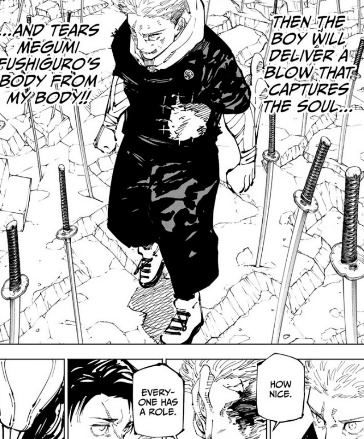
If Yuji's thinking hasn't changed then no story arc has taken place. If this conflict of Yuji wanting to conform to a cog or a role has persisted since Shibuya - then it's clearly important to his arc and is something that needs to be resolved. If Yuji just solves the problem by being stronger than Sukuna and beating him in a fight, how does that resolve Yuji's flaw of clinging to roles rather than thinking for himself? I ask once again, where's the change?
Saving Megumi like a damsel in distress is still a role someone else has assigned him.
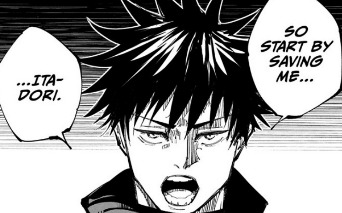
How does the decision to save Megumi right now challenge Yuji's hero complex in any way, besides the fact that Megumi has sunk into despair and would rather just end it all. Is that much a conflict that really forces Yuji to think for himself - to go against the grain of society rather than blindly following others.
If Yuji gets to rescue Megumi like a damsel, that's giving him what he wants, without forcing him to realize what he needs. That's as much of an unfullfilling end to Yuji's arc as a ending where Megumi never reclaims his agency and stands on his own feet and just has to sit there and wait and be passively saved.
Most of all the question: "Is it possible to save someone who's not prepared to be saved?" goes unanswered.
Geto wasn't just depressed and suicidal, he was actively making harmful choices and represented a danger to others. He also had no intention of stopping the path that he was on.
There's a clear parallel between Megumi and Yuji's friendship, and Geto and Gojo's past fallout. However, if it's just a conflict of Yuji saving Megumi who's simply too suicidal and doesn't want to go on living, there's no conflict there. The audience will not see whether or not Gojo was still capable of saving Geto post his burning down the village, or if there was no walking back from that choice. The previous generation won't resolve or fix the mistakes of the past generation.
Yuji remains a hero, Megumi remains a victim, as I reiterate for the thousandth time there's no change.
Megumi starting the merger, or even defeating Sukuna himself (maybe with a completed domain expansion) and then starting the merger is a change. It's also foreshadowed, Mahoraga is the technique he inherited, the technique Sukuna stole (and Mahoraga won't work against him he's already defeated it), Megumi's domain expansion is his own creation, created in his deepest moment of personal growth.
The process of individuation also literally requires a character fully integrating their shadow. Sukuna possessing Megumi is not Megumi facing his shadow or his worst traits, because Sukuna is not Megumi's shadow, he doesn't reflect Megumi's flaws in anyway, he's literally just a parasite.
There's also the 1001 Toji parallels to Megumi that have gone unfulfilled. Toji specifically a character who was abused, then chose to continue the cycle of abuse, specifically because he wanted to prove himself stronger than the peak of sorcery. Especially after a lifetime of being belittled and abused by not having the potential of his Heavenly Restriction recognized.
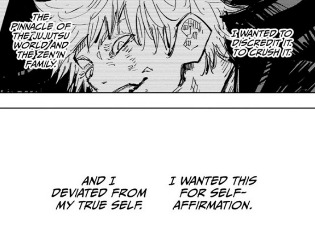
And what do we have here, but a scene of Toji LITERALLY EMERGING FROM MEGUMI'S SHADOW, in order to enter Dagon's domain.
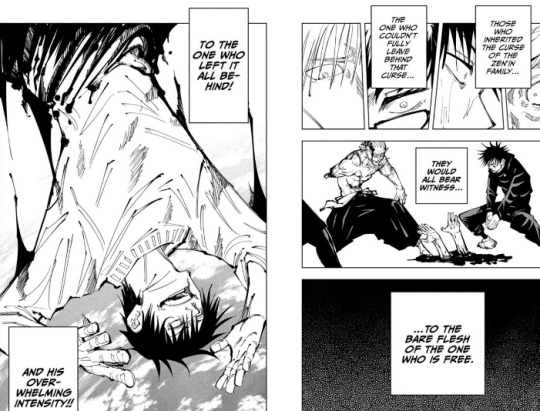
How is Toji referred to afterwards? As a puppet of carnage bearing his fangs at the strongest around.
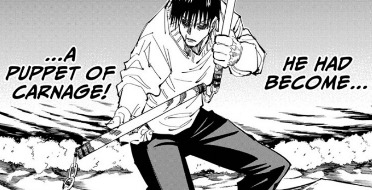
An incredibly Sukuna like description, number one because Sukuna's entire existence is simply bearing his fangs at the strongest around, and number two Sukuna is referred to as pure destruction, like a calamity, something with overhwelming sense of self and no humanity.
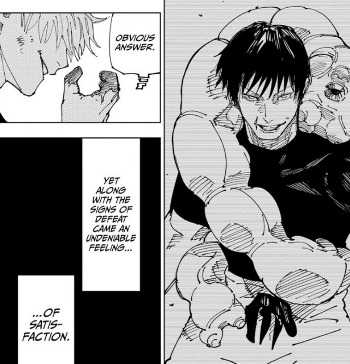
Not only that, but when fighting Sukuna, Gojo makes an explicit reference to Toji comparing him to Sukuna as the last time he ever felt nervous or challenged by an enemy. Sukuna and Toji are being alligned as similiar characters, supremely selfish people who hoard their agency and strength. Toji also represents the worst of Megumi, a victim caught in a perpetual cycle of lashing out against the world, a bad future path he might take if he doesn't get over himself.
Sukuna is connected to Toji wo is connected to Gojo, and all three represent a path that Megumi has been nudged down his entire life, that he should just selfishly use his power with no regards to anyone else the same way they do.
As I said before in my comparison to Jean, why wouldn't someone who's been robbed of all agency for so long, not go too far in reclaiming it? What's stopping them now that the chains are finally off?
Megumi parallels Geto, who parallels Toji, who parallels Sukuna and why draw all these lines between these characters if it's not to represent a path that Megumi could take?
In other words...
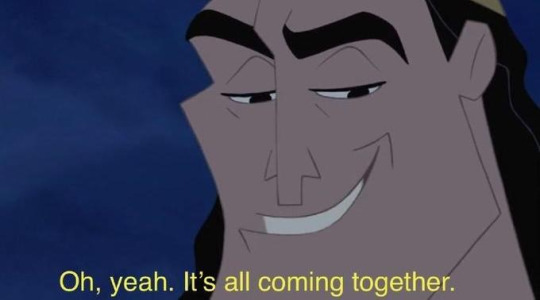
#megumi fushiguro#jjk meta#jujutsu kaisen#ryomen sukuna#geto suguru#fushiguro megumi#gojo satoru#jujutsu kaisen meta#jujutsu kaisen theory#jujutsu kaisen spoilers
191 notes
·
View notes
Text
Why “Hiding in the Light” Didn’t Work: Stranger Things’ Psychospiritual Implications
Supplementary Sources: Jungian Theory & A Wrinkle In Time
Alright, buckle in. I’m running on a year’s worth of spiritual awakening, deep dives into Jungian theory and non-dualism, and my own ego’s primary coping mechanism: immersing myself in media as escapism. The purpose of this analysis is to break down the themes of non-dualism and light/darkness in ST (and maybe predict some character arcs), and also to position the narrative of ST as a psychospiritual wake-up call.
For some context: last year, I discovered the work of psychoanalyst (or philosopher, depending on who you’re talking to) Carl Jung. He had a pretty extensive theory about the human psyche that I immediately connected to the themes throughout Stranger Things, specifically Vecna’s mind control and curse. I’m going to break Jung’s theory down as succinctly as I can, and then delve into how it plays out in our favorite gay monster show.
But before I delve into Jung’s ideas, I also think it’s important to define selfhood (you’ll understand why in a minute). For the purposes of this analysis, the experience of the “self” is an illusion created by our senses, perceptions, memories, and consciousness, all of which are impermanent. Therefore, the self is what we call “conditioned.” There is no you or me, just the ideas we have of ourselves.
Now, we can get into Jung’s theory. He posited the following:
1. Every individual has a “persona” they show the world (a constructed self) to feel like they belong. Underneath this persona, everyone has a personal “shadow,” or the part of themselves they don’t want to acknowledge. This shadow is always projected onto others— every negative thought we have about someone else is a product of our own unintegrated shadow. Note: The shadow is NOT bad, it just “is.” It’s actually there to HELP us grow and integrate all the unhealed parts of us.
2. Individuals’ shadows are usually part of their unconscious, meaning most people are not aware of their shadow side or cannot bear to delve into their trauma/darkness and begin to heal it.
3. All of human consciousness is CONNECTED. This means two things. 1: There is a “collective unconsciousness” that contains the sum of all of our unintegrated trauma, and 2: We can heal our collective unconsciousness by healing our own unconsciousness.
How do we heal our own unconsciousness? By becoming AWARE of our shadow side, accepting and forgiving the conditioning that created it, and working to encourage others to do the same.
What— or rather, who— does that remind you of?
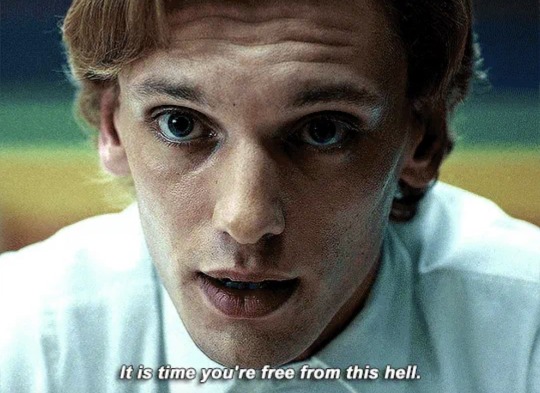
Also— great use of lighting here.
We know Vecna has direct access to his victims’ consciousness; not just their memories, cognition, and emotions, but also their awareness itself. This is how he’s able to target and trance people. But it’s not just their consciousness Vecna has access to; it’s their unconsciousness. Their shadow. Their trauma. Yes, he has psionic abilities akin to El’s, but as far as we know, El can’t access the collective unconsciousness like Vecna can. She is only capable of “remote viewing” via the void or piggybacking into people’s minds. So why is Vecna capable of this?
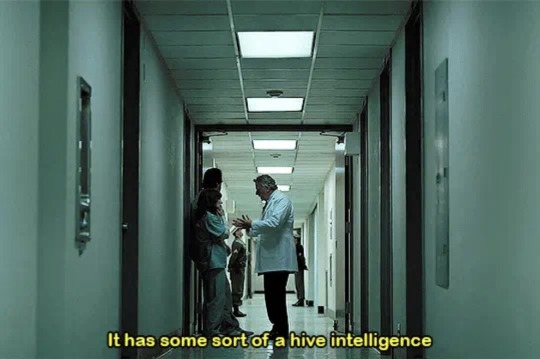
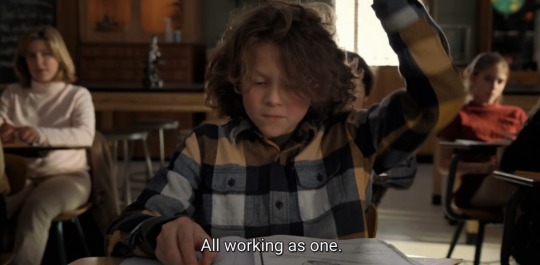
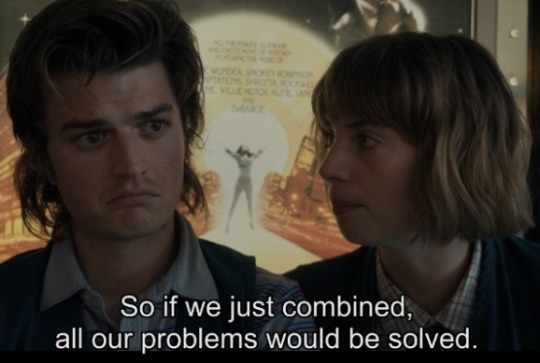
If you want my take on it: the only way to access a collective shadow would be through accessing your own shadow. So is Vecna really Henry, or his unintegrated shadow? And is either really condemnable, considering the larger themes of the show?
We see this theme of non-dualism echoed in Brenner’s NINA pep talk with El:
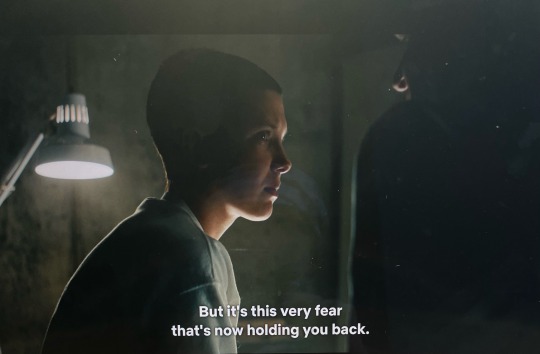
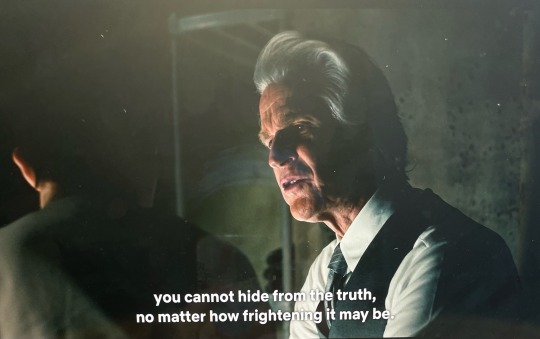
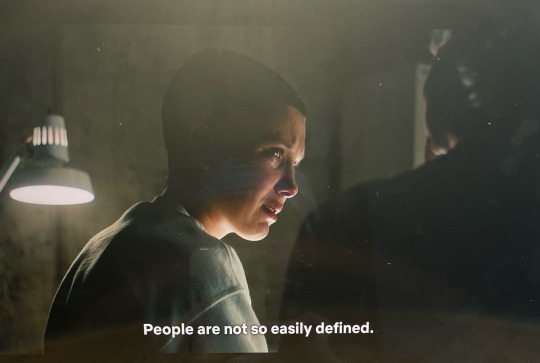
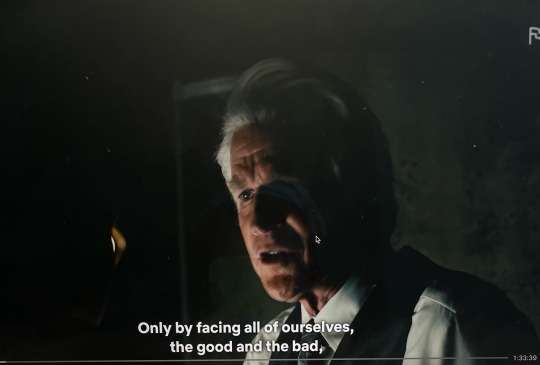
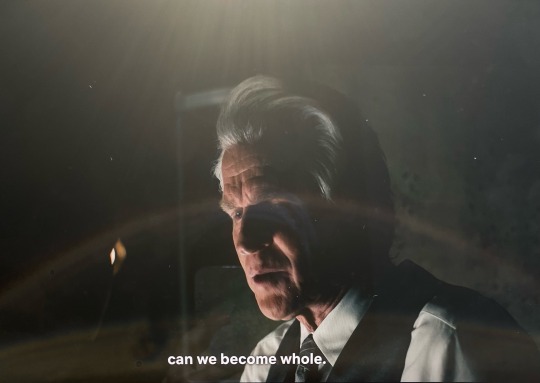
It’s fascinating to me that they’re communicating these bigger thematic ideas through the show’s “villians”— while the above conversation could be taken at surface-level as Brenner being manipulative, it’s important to acknowledge the truth of what he’s saying. NINA is only successful because El faces “the good and the bad.” This is why “hiding in the light” is a no-go for Max.
Focusing only on happy memories is a form of emotional bypassing. Throughout the show, we’ve been told time and again that hiding doesn’t work. Neither does running away. The only way out for our characters is through their own shadows.
Now, the fun part: predictions. Looking at all of this with a Jungian lens, it doesn’t make much sense to villianize a character or to end the story by “defeating evil.” In non-dual theory, there are no evil people, only unhealed ones.
We know what worked for our characters temporarily (Will in the UD, Max in her first trance, El using her powers against Vecna) was the memory and vibration of love.
This reminded me of A Wrinkle In Time, which is a science fiction novel that’s been noted more than a few times as one of Stranger Things’ primary influences. In the book, a girl and her brother travel through time to rescue their father from an alternate dimension where all beings are controlled in a hyper-individualist suburbia by a giant, all-knowing brain. The climactic “defeat” of the brain is shockingly simple, but incredible impactful— Meg, the heroine, tells it over and over that she loves it. This love ultimately brings her father and brother out of trances they are in, and they’re able to remember her and travel back home.
(Tangent: And God. The implications of that, outside of analyzing ST, are powerful. How do we live in a capitalist hellscape that is so caught up in the mind— in acheiving, obtaining, securing, protecting the ego— that many of us have forgotten our hearts? The answer is love. Loving ourselves more deeply to love all beings more deeply, “the good and the bad.” But love does not negate accountability, and it does not excuse harm.)
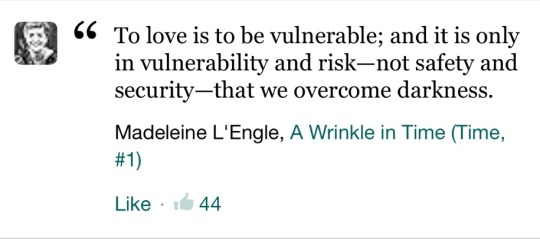
Our characters are all struggling with self-acceptance and self-love in some form or another. Each is wrestling with secrets and lies, and the desire to hide parts of themselves they think others can’t accept.
Mike is clearly struggling with self-loathing, guilt surrounding what happened to El in s1, and a crippling hero complex.
Will is also on the self-loathing train, continually self-sacrifices to his own detriment, and is hiding his identity out of fear (not at all villifying that, just for the record.)
El struggled to reconcile her abilities and forced weaponization with her identity outside of the lab pre-s4.
Max was suicidal and had a lot of self-hatred after B*lly’s death.
Nancy parallels Mike in her survivor’s guilt post-s1 and exhibits the same lack of self-preservation and self-sacrificing tendencies.
You get my point. So how will these characters overcome their trauma? Not through hiding, or running, or bypassing. Not through the light alone. Through love— acknowledgement of their own darkness, compassion for the unhealed nature of others, and commitment to being honest with themselves and their loved ones. We know Will is El and Henry’s mirror/foil and will play a central role in S5, and with all of this in mind I think it’s safe to say he will break the cycle of bypassing and hiding from trauma and pain once and for all. He won’t fight it like El, hide from it like Max, or run from it like he did as a kid.
Only by integrating their shadows can our characters become truly “themselves,” or as Brenner puts it, “whole.”
I will probably have much more to say about this after my re-read of A Wrinkle in Time, but for now, that’s all I’ve got. :) Hope everyone is doing well!
#i dont normally do posts like this but my brain has been whirring lately#stranger things#byler#mike wheeler#will byers#vecna#henry creel#st5 speculation#st analysis#stranger things analysis
164 notes
·
View notes
Text
Examining SVSSS Canon: 1/∞
SHEN YUAN'S PIDW-READING TIMELINE
One question and argument that comes up frequently in SVSSS fandom is, how long did Shen Yuan read PIDW for? Was he following it from early serialization, or did he simply binge everything toward the end?
This question isn't exactly one that is easy to answer either-- considering that there are actually various direct quotes that could be read in contradiction to one another regarding it.
Based on the information in the novel, we are left with several potential theories as to Shen Yuan's reading timeline. In this post, I will be presenting these theories, along with supporting evidence from the novel.
Theory #1: Shen Yuan picked up PIDW and binge-read it from beginning to end for the first time in 20 days before dying
This theory is directly supported with a quote:
He’d spent twenty days binging the novel from start to finish, so he had clean forgotten that whump-filled arc of pointless abuse that covered Luo Binghe’s beginnings at the sect, okay?!
(7 Seas, Ch. 1)
In the original text, this line is 他可是看了二十天才看完的. Broken down, this is literally "he indeed read it (他可是看了), it took him twenty days (二十天才)to read the whole [novel] (看完的)."
*note 可是 may also be equivalent to "however" or "but" in some circumstances, but is generally used to provide emphasis.
However, depending on where one puts the emphasis and pairs syllables in the last part, there could be different interpretations. If read as 看 完的 it implies "read the entire thing," but if read as 看完 的,it implies "finished reading." I read it the first way, but I don't know if that is the "most correct," so there is some ambiguity there.
It is also implied later that PIDW was already very long and full of plot holes when he began reading it:
So, if back when he’d just opened this baffling book, this Proud Immortal Demon Way, which was so full of landmines that it was practically high art, to the point that those landmines had become its very style...
He would definitely have grabbed the brick that was the entire fifty-volume set and showed them what their brains looked like when splattered across the ground.
(7 Seas, Ch. 21)
Though this could be related to the final length of the novel, and the "fifty-volume set" is likely exaggeration or metaphor. In one of his forum posts, he also says:
I understand what OP is feeling.��I’ve been reading this novel lately, and it’s so damn long—long and pumped full of filler...
...All my fellow readers have already roasted the setting for the last three hundred thousand words, so I won’t say more on that.
(7 Seas, Ch. 26)
This part where he says he has been reading the novel lately, implies that he began not too long ago, rather than following it for years. Of course, Airplane already at this point finds his username and comments familiar:
His eyes automatically highlighted that familiar ID “Peerless Cucumber.”
(7 Seas, Ch. 26)
So it could also be said that he is downplaying his dedication with that statement. He does, however, state that the other readers have roasted the setting, but doesn't mention that he himself has done so. Additionally, the "three-hundred thousand words" mentioned may refer to the comment section, not the novel itself, so there is still some ambiguity to that point.
Theory #2: Shen Yuan has been reading PIDW long-term throughout serialization
There are multiple quotes directly supporting this theory:
He could guarantee it on all the youth and frustrations he’d wasted following this twenty-million-word-plus serialization for years.
(7 Seas, Ch. 6)
and
Everything that had happened before was as unto smoke. From today forth, as he walked the jianghu, he would use this ID, which had been plastered all over the comments section for years.
(7 Seas, Ch. 9)
The second quote may refer to comments sections on Zhongdian literature in general, but the first one is more directly referring to PIDW. There is a slim but unlikely possibility that he referrs to the years he has spent within the PIDW universe, rather than just reading the novel. That possibility is made even less likely by the following quote:
Next, let a veteran reader of this novel, Shen Yuan, omit the countless fanservice-y details and concisely summarize the million-word epic for everyone…
(7 Seas, Ch. 1)
Where it refers to him as a veteran reader of PIDW specifically (and this TL is consistent with the original implications). It's unlikely for him to be referred to as a veteran reader if he had only been reading the novel for twenty days.
As one can see, if you go by either of the above theories, there are direct conflicts and contradictions, and arguments to be made either way. This could be written off as inconsistency. However, there are two additional options and theories which can resolve those conflicts.
Theory #3: Shen Yuan had been a casual reader of PIDW for years, but rushed to finish reading it through to the end in 20 days
One possibility is that Shen Yuan had been reading PIDW casually over several years, but wasn't caught up by the time his death drew near. Shen Yuan's cause of death is a matter for another post, so I won't discuss it here, but the following quote lends some support to this reading:
“Dumbfuck author, dumbfuck novel!” With his dying breath, Shen Yuan spat this final curse.
Who could have imagined that an upstanding young man like him—who had properly purchased the website’s VIP currency and read the novel’s official version—would find himself persevering before his untimely death to finish a novel so stallion, so money-grubbing and overly padded, that it left him speechless with rage? How could he not curse?
(7 Seas, Ch. 1)
Here, it seems that Shen Yuan may have been aware of his upcoming death, and so he may have wanted to hurry and finish reading the novel before he died. In the original text, the phrase is: 临终之前坚持看完的, which can be broken down as "before his untimely/sudden death (临终之前), he persisted to finish reading [the novel] (坚持看完的), though this may also be read as "he persisted in reading the entire novel," depending on how one puts emphasis in the sentence (same issue as the first quote in theory 1). 临终 means literally "near the end," but is a term for death or one's deathbed. Another way to translate 临终之前 would be "before meeting his end."
So, because he was persisting/persevering in finishing the novel (either the whole thing or just to the end), it may be that he expected his incoming death, or that he simply wished to persist in reading the novel to its end and his death still occured unexpectedly.
坚持 implies some level of urgency or steadfastness, but it may not refer to reading the novel quickly, but simply dedication to slogging through all of the bad porn and reading it to the end, rendering this theory a bit shaky.
Theory #4: Shen Yuan had been reading PIDW since early serialization, but re-read the entire thing in the 20 days before his death
This theory would resolve all potential conflicts-- making it true that he both followed PIDW's serialization for years and read the whole novel in 20 days. As to why he re-read the full novel, perhaps it was because the final chapter had been posted or was coming up, and he wished to reread from the start in preparation for that-- this could also drive him into an even greater rage about the contents of the novel and how repetitive and filler-heavy it is, as this would become more and more obvious on a binge-reread from start to end.
One weakness in this theory, though (pointed out by @verycharismaticdragon) is that if he read it twice, it would be less likely for him to completely forget details as mentioned in the first quote. Not entirely impossible-- one can still forget details even after multiple read-throughs, but just less likely to completely forget.
Theory #5: When Shen Yuan began reading PIDW, he binged all available chapters in twenty days, before following it consistently afterwards.
(theory courtesy of @verycharismaticdragon)
While this would not be particularly likely if the quote from theory 1 and the quote from theory 3 were linked together, those two quotes don't necessarily have to be linked-- it's possible that Shen Yuan would have binged the entire novel as it was at the time he found it in twenty days, then decided to continue reading as it updated, persisting and persevering because he wanted to reach the end despite the novel's trashiness, and then ended up dying.
Particularly, this makes a lot of sense in the context of the following quote:
Even though this famous Lord Cucumber spewed criticism constantly and without end in “Great Master” Airplane’s comments sections, his subscription payments and demands for updates never waned.
(7 Seas, Ch. 26)
If Shen Yuan hadn't been caught up with the novel (as theory 3 would state) then it wouldn't make quite so much sense for him to be demanding updates, and if he hadn't been reading it for even a full month, there was no reason for him to make consistent subscription payments.
*******
Ultimately, which theory you choose to believe depends somewhat on the way you view canon-- whether the seemingly contradicting statements were intentional, or whether they were merely a consistency error.
These are the only theories that I can think of, but feel free to add any additional theories + support quotes and analysis if you have them!
One final note, in regards to WHEN DID SHEN YUAN START READING?
If it's true that Shen Yuan began reading PIDW earlier in serialization, how early was that point? Was he reading it from the beginning, or did he start later?
I personally believe it was later. Though he says he was following the novel for years, that could mean anywhere from two to four years since the total serialization of PIDW took place over four years:
How could someone who’d cursed “dumbfuck author, dumbfuck novel” remember ancient content from the beginning of a serialized novel that had been running for four years and covered an in-narrative span of two hundred years?
(7 Seas, Ch. 1)
While it's hard to place exactly when he started reading, it seems that Shen Yuan began to read PIDW before the Immortal Alliance Conference arc, as he discusses the novel's online performance before that point:
Before this event, Proud Immortal Demon Way’s performance online had been steadfastly lukewarm. But once the Immortal Alliance Conference Arc debuted, the reviews, comments, subscriptions, and tips all soared into the heavens.
It wasn’t only because from that point forward, “Great Master” Airplane Shooting Towards the Sky abandoned the last of his already minimal moral principles... there was another important “it” factor. It was, in fact, the main element that had first compelled Shen Qingqiu to follow the novel until the end.
The demonic beasts!
(7 Seas, Ch. 4)
It also seems that he wasn't entirely dedicated to reading the novel before then. However, he may have caught up with the serialization a bit later-- for example, if he started reading just before the conference, he would have known that it was a little-known novel before, and been able to watch the rise in popularity in real time even if he himself hadn't caught up to the conference just yet, before only deciding to dedicate to reading the full novel once he caught up to that part.
There are many possibilities and uncertainties in regards to Shen Yuan's reading timeline, but I do think there is enough information here to form decently solid theories-- so I will leave it to my readers to decide, now that the information has been presented, which ones they think are most likely and which they wish to use in their analysis.
#canon examined#svsss#shen yuan#pidw#super interested to see the debate on this post#i know i didn't include every single quote#but i did try to get the most relevant ones#i can't definitively say my chosen theory is the be all end all correct one since it depends so much on reader opinion re: consistency#but hopefully people can decide for themselves what fits best#anyway-- new post type debut!#updated
292 notes
·
View notes
Text
What Cyberpunk DeadBoy Means and What it's Potentially Foreshadowing (aka very complicated analysis that makes a lot of sense and could happen depending on how colorpalet is feeling while writing the story)
Now I'm seeing so many people like running around wondering what this event could mean for the future for multiple reasons and like I've made like one post throwing my hat into the ring.
I've been frustrated with people's unwillingness to realise that this comm is prob foreshadowing because this is not the first time Colorpalet has hidden foreshadowing into comms weither subtely or not
Exemple's being :
-Akito's second comm foreshadowing his third event
-Lower's cover art literally foreshadowing what would happen to Mafuyu's phone in her event
-88 vocals being emurui and nenekasa foreshadowing the kind of dynamic the disbandement arc had with nenekasa wanting to move forward with emurui being scared of isolation
-Probably way better exemples that I forgot
I've seen people make Some assumptions which I don't agree with but there is one thing I think is true
There is 100 pourcent gonna be struggle between corporation/reality and WxS.
Purely because that's been WxS's entire theme since the beginning. They constantly bash you over the head with the theme of compromising with reality and the importance of dreams. In fact the pick of Maiki-P is not at all surprising as he basically has the same message WxS has just... well harsher.
The Big thing people have ignored however is by focusing on the lyrics, they've ignored something that's personally to me even more telling and that's the line distribution
We know for a fact colorpalet loves to mess around with line distribution, weither it's to make characters say lines that fit them or to kind of foreshadow their headspace.
Now something Big happens with the line distribution of Cyberpunk Deadboy that i've seen NO ONE notice and that's in the last chorus (that and also Tsukasa's lines which people have pointed out but it works less on it's own which is why I'm gonna analyse his lines afterwards).
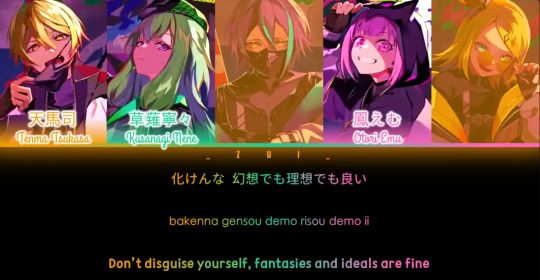
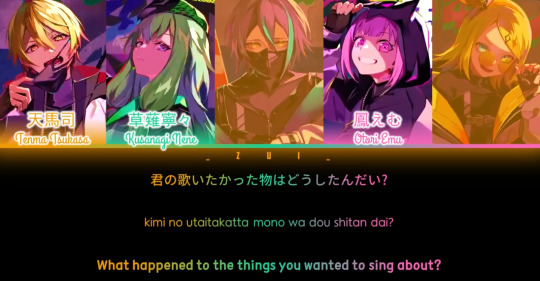
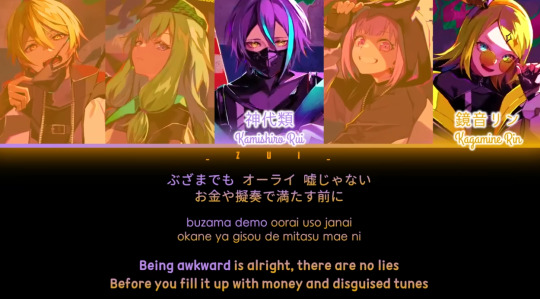
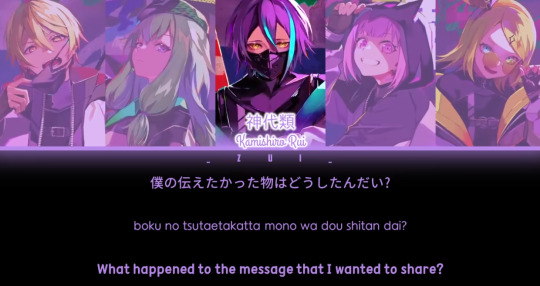
This is the only time the chorus is like that, the others have a much more even distribution.
In fact the distribution choice makes it look like the rest of WxS is Talking to Rui.
It's even more evident considering the lines they chose to make WxS sing compared to only just Rui
Emu/Tsukasa/Nene saying kimi (you)
Rui saying boku (i)
Which honestly makes me think this is colorpalet foreshadowing some kind of issue reguarding specifically Rui. Remember Emu's second event ? The story of Rilley whose imagination was crippled by the industry to the point where he didn't really have any artistic vision until Emu's grandpa helped him.
In fact remember how the flashback that showcases that has Rilley working on a film
Now we get to Tsukasa's line which have been pointed out to be kind of sus but it's not just his lines.
Tsukasa refuses to sing with Rui (unless it's a line they all sing together but i consider those exceptions). In fact pretty much everyone has a duo line with each other except those two.
In fact in the section where Rui has duo lines with everybody, Tsukasa is the only one he doesnt sing with and the visuals make it clear that it's something that we're supposed to find strange
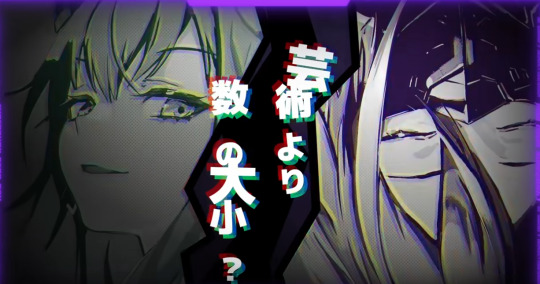
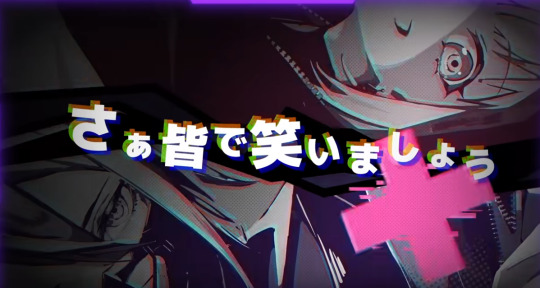
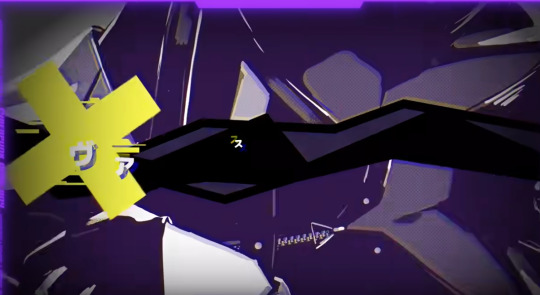
And then we of course have Tsukasa's solo lines
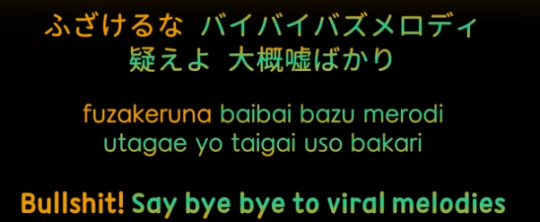
Tsukasa is the only one that say "fuzakeruna" outside of Rui (of course ignoring entire group WxS lines) and i've seen some people pointed out how it sounds like he's saying it in response to Rui's lines. Which I agree with.
Then we got his big boy solo lines
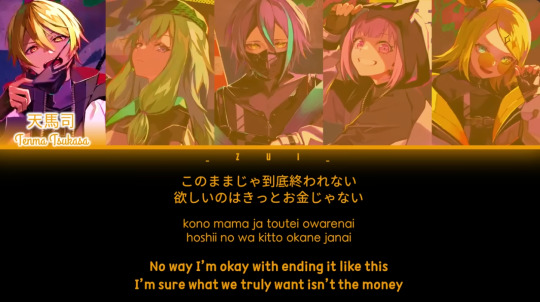
These lines will make more sense with my theory/analysis but right now if we go with the idea that WxS in the last chorus were speaking to Rui and Tsukasa in this comm refuses to sing with Rui then this implies those lines are Tsukasa speaking to Rui.
And this is where the insanity begins because people have pointed out a concerning trend with Ruikasa that I know some people use for shipping fuel but for me kinda feels more so like foreshadowing.
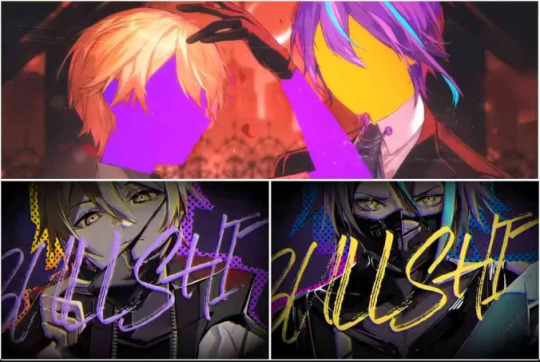
IGNORING all the ARG ass weirdness of the Fixer 2dmv, this choice to switch Ruikasa's colors have to mean something in my opinion outside of just wholesome shipping influence especially considering the two songs they do this are less than jovial.
What this kind of color switching signifies to me is that, Ruikasa somehow are/or will switch places.
And with that let me bring back Tsukasa's lines

These lines stand out because Tsukasa before remembering his dreams was extremely shallow only doing things for fame and probably the money that would come with it.
Now if you think about everything I've layed out I think you can gain a pretty clear picture.
Of Rui falling into the trap Rilley did, becoming jaded and losing the true motivation of his dream (or at least starting to have doubts). Becoming stuck with the struggle of managing dreams and reality.
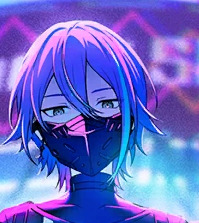
Rui's costume even has a mask which can be a metaphor for his artistic voice and individuality being silenced .
Which now you get into the line distribution where WxS is implied to be talking to Rui.
And you get to Tsukasa, who is refusing to sing with Rui and in fact seems to be arguing with Rui if we really want to overthink it. In fact almost switching their roles from the main story.
Because Tsukasa has grown now and how else to show that growth than to switch Rui and Tsukasa's perspectives/roles.
Now how this would happen really depends since there are multiple ways they can go about it with the time they have.
There is obviously mystery dude dude (who i know now is sakaki) who still gives me bad vibes. However there is actually two way they can make mystery dude trigger this sort of plot :
-Mystery dude is malicious and actively manipulates/confronts Rui to make him rethink his worldview
-Mystery dude isn't malicious but instead is just jaded/has been through a lot of industry bullshit which ends up rubbing off on Rui accidentally
But you can even just not have mystery dude involved with this at all (which i doubt but still) because you know what loose plotpoint is still lingering over WxS, fucking Asahi
Rui still has not talked about Asahi to WxS, in fact Curtain Call ends on an explicit cliffhanger which is never really emotionally concluded (at least in Rui's own events, technically the arc ender did but there are still a lot of loose threads from that arc). Why would Colorpalet make Asahi come back after Rui graduates, they could've just had him disappear into the sunset but instead they hint at his potential comeback.
Unless Rui will be forced to again confront similar feelings he did during Curtain Call this time with possibly an added layer of whatever happens during WxS's freelance arc.
Anyways yeah this is overly complicated but then again colorpalet is not being easy with us so...yeah.
#project sekai#pjsk rui#rui kamishiro#wxs#wonderlandxshowtime#project sekai theory#project sekai analysis#rui kamishiro analysis#wxs rui#wxs tsukasa#tsukasa tenma#rui#cyberpunk deadboy#i'm sorry if this giant wall of text makes sense to nobody but me but i need this to leave myt mind otherwise i explode#and also i'm not looking at twitter for theories of this event because twitter is the breeding ground of bad takes so idk if i'm the only#one but it's very interesting#anyways i really don't want any “but what if the comm is not at all related to the event at all” because we've had active confirmation#colorpalet describe events and give at least on sentence prompts to commissioners (which we know pinnochioP and the creators of Mr.Showtime#I believe) and again even if it WERE the case and it was a fluke or a rewrite or whatever#it doesnt change the fact colorpalet made an active choice to make the line distribution and 2dmv like this#this is the motherfuckers that foreshadowed an arc ender years before through a fucking song cover art#complain about their writing all you want these motherfuckers love little detail oriented shit like this for better and for worse
320 notes
·
View notes